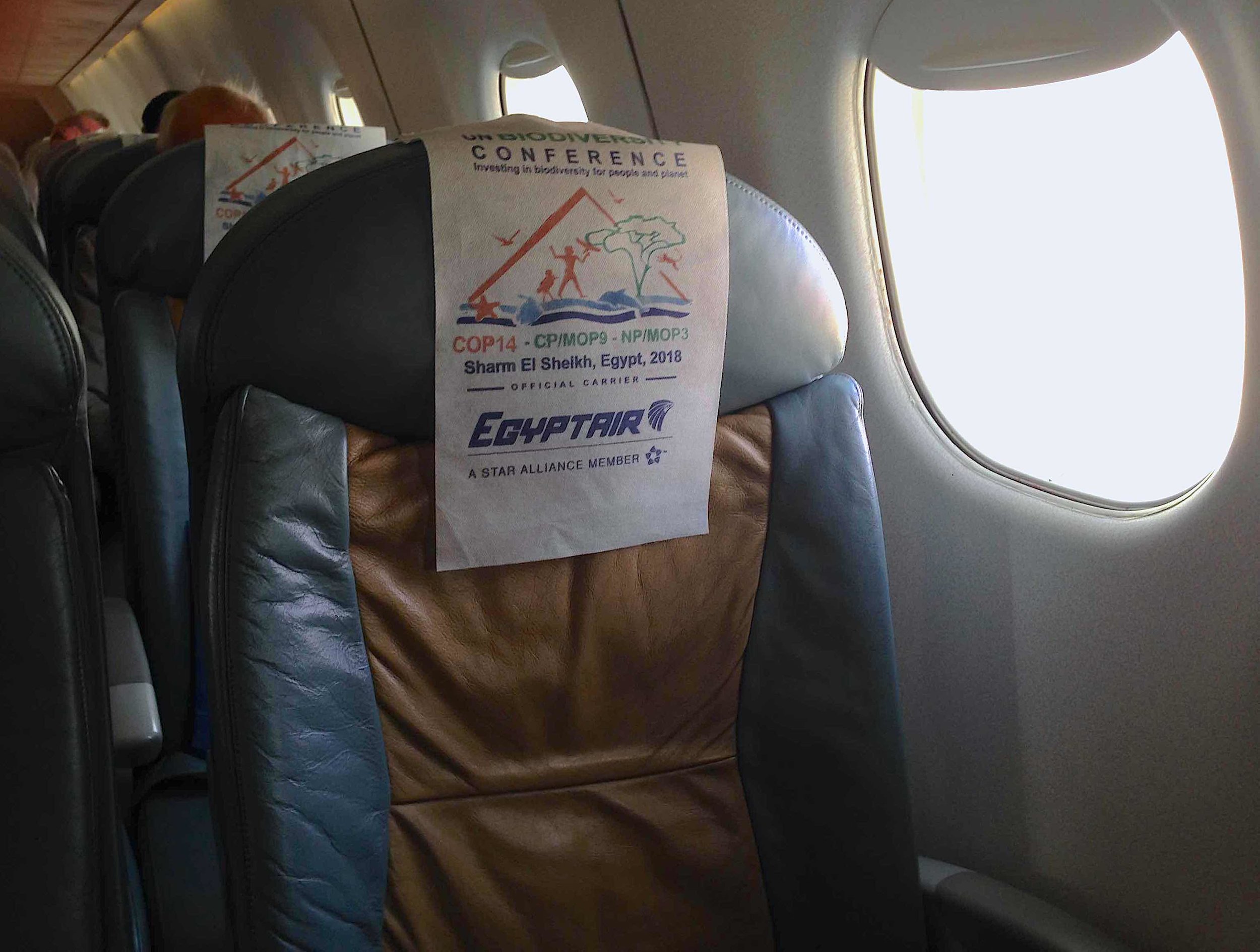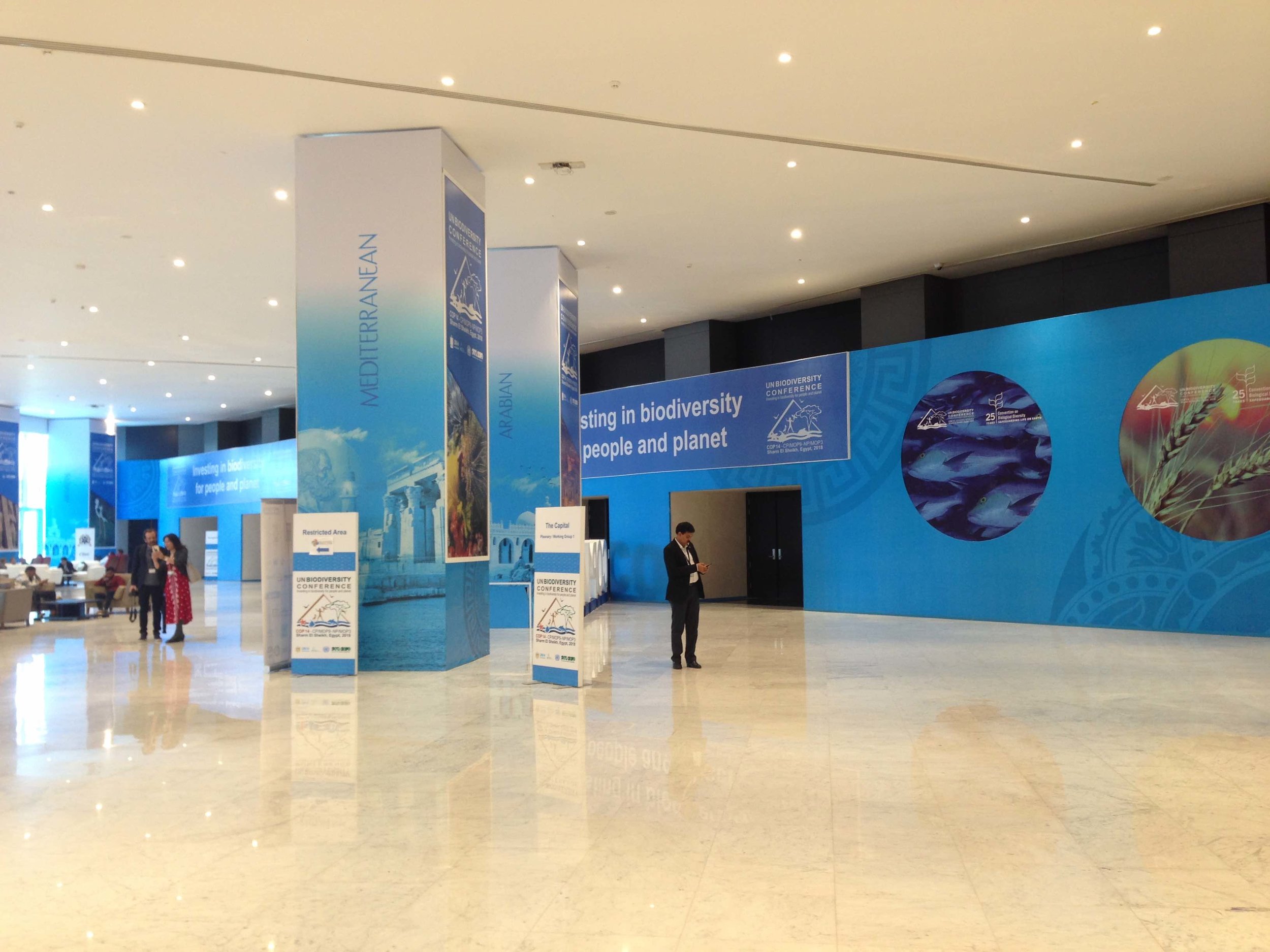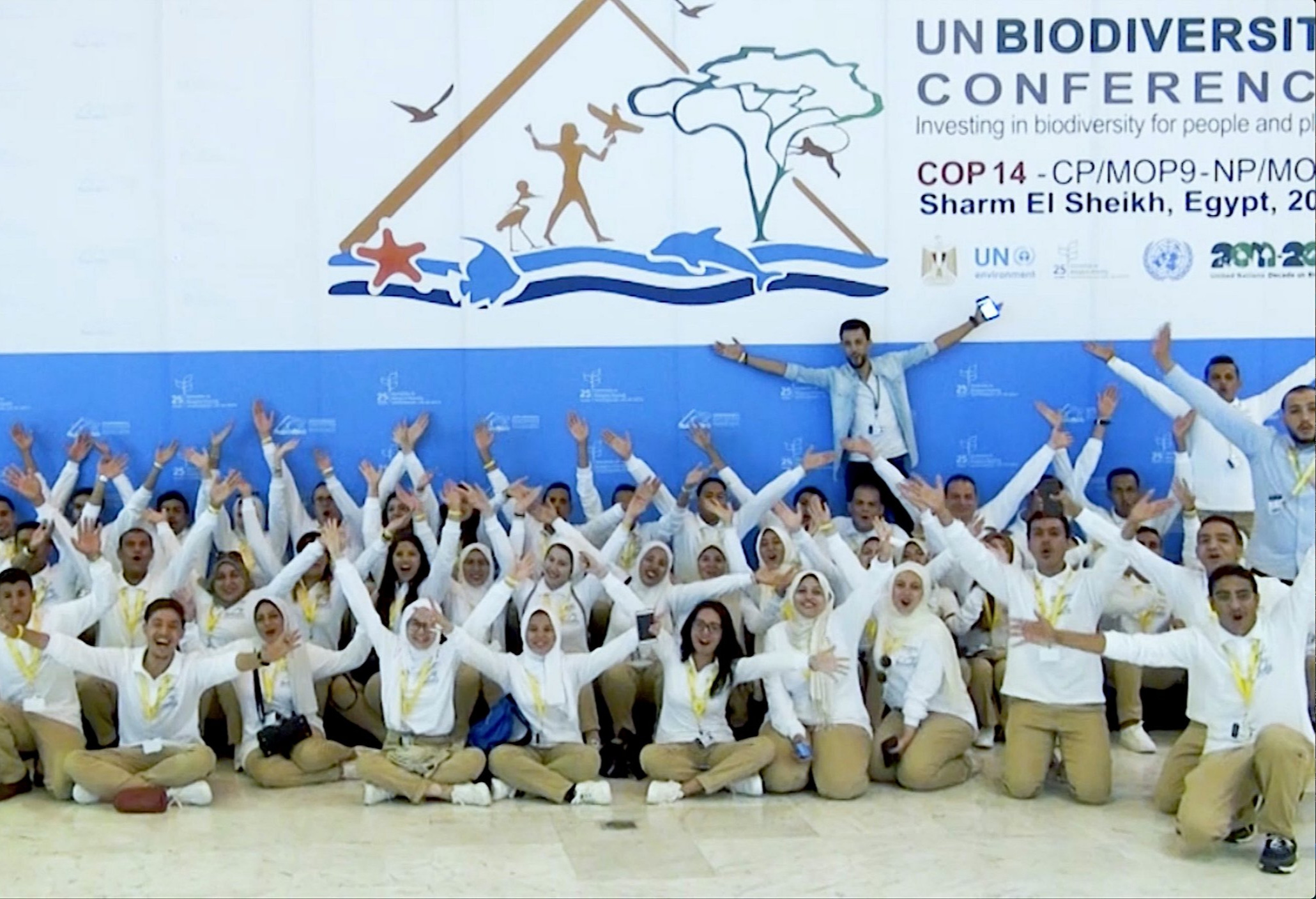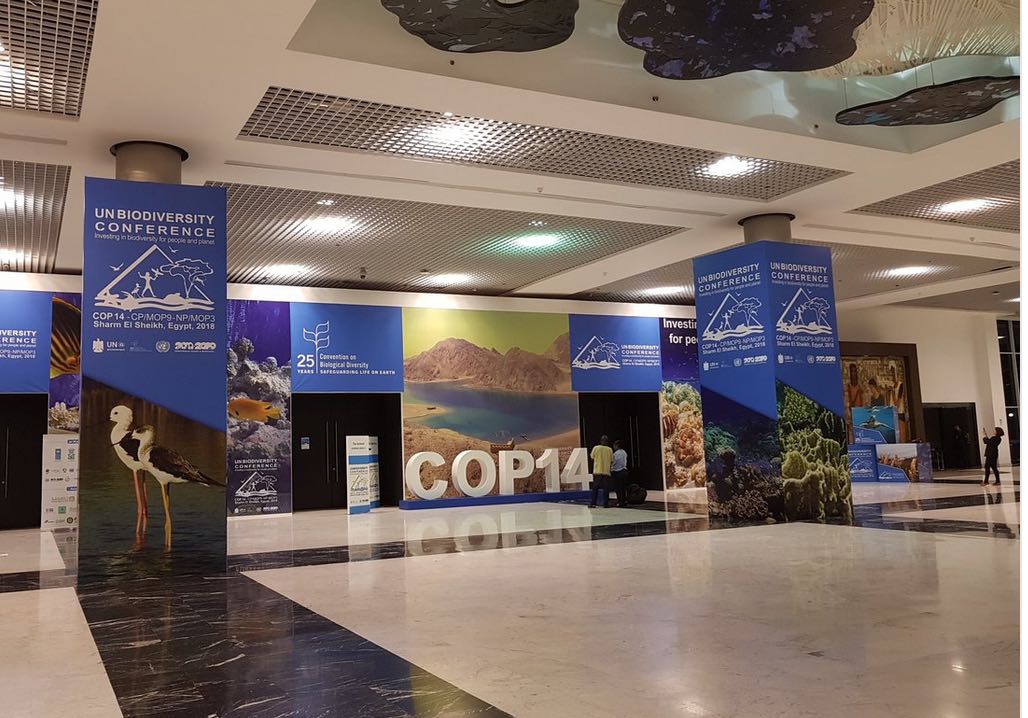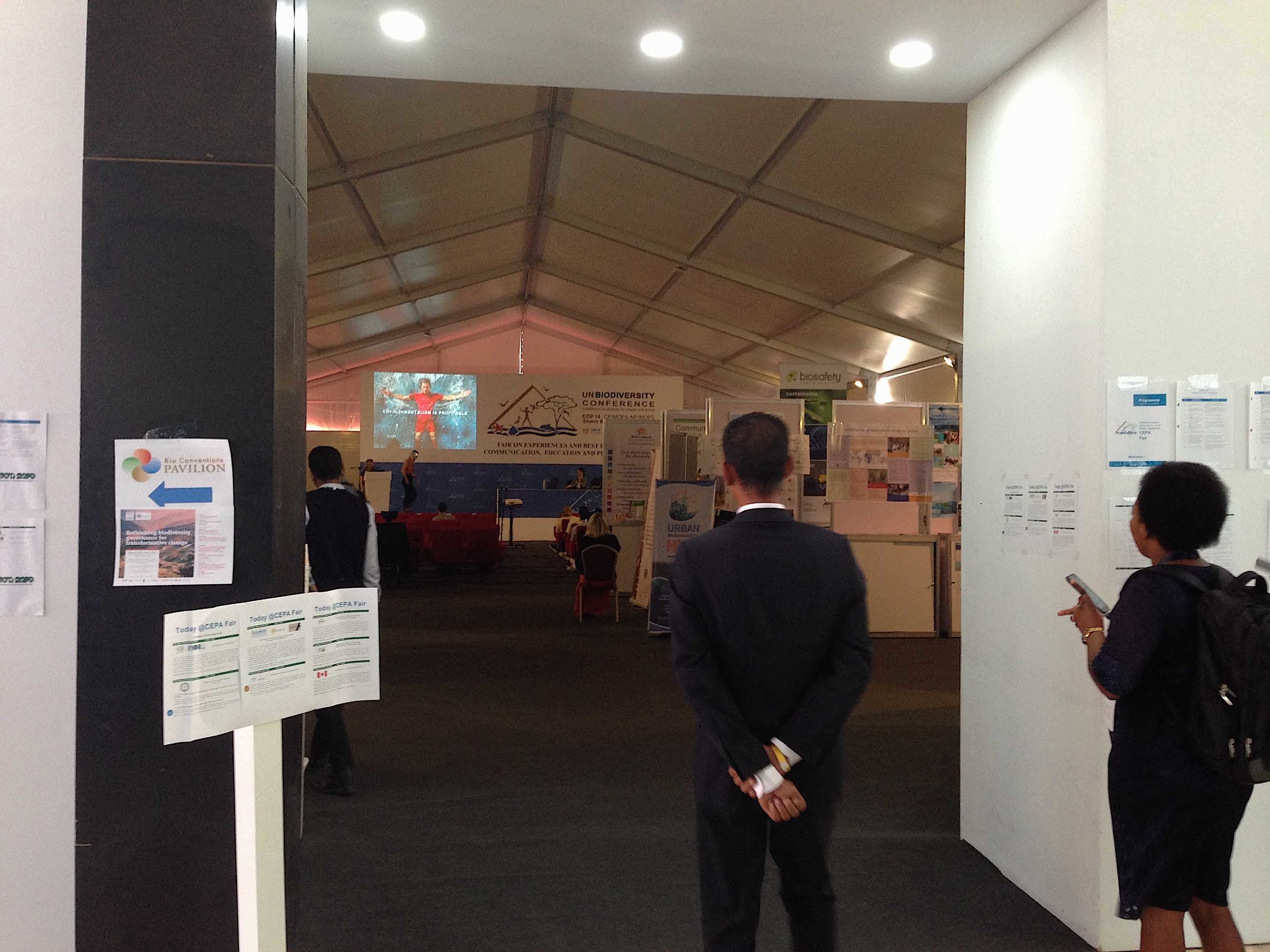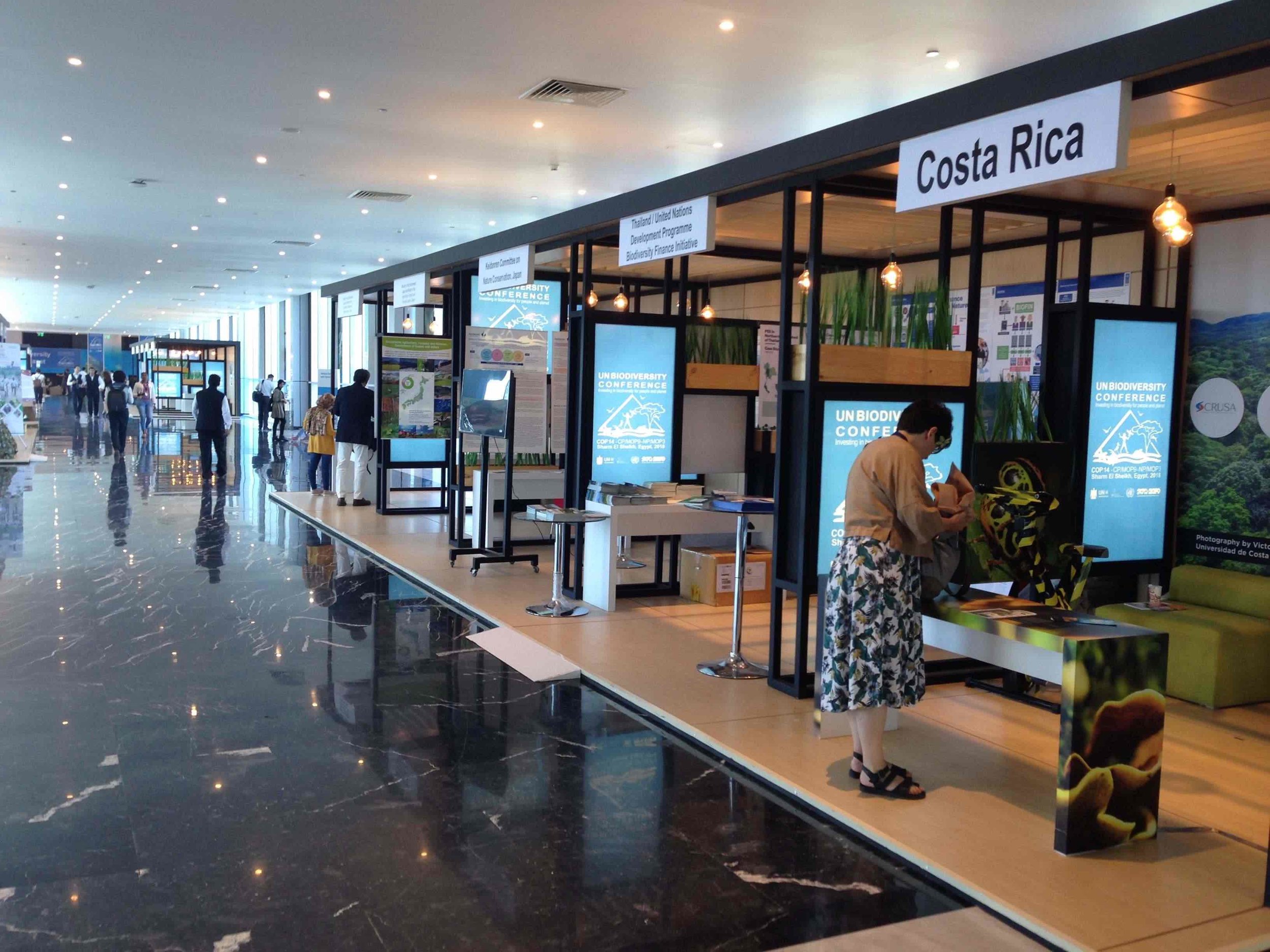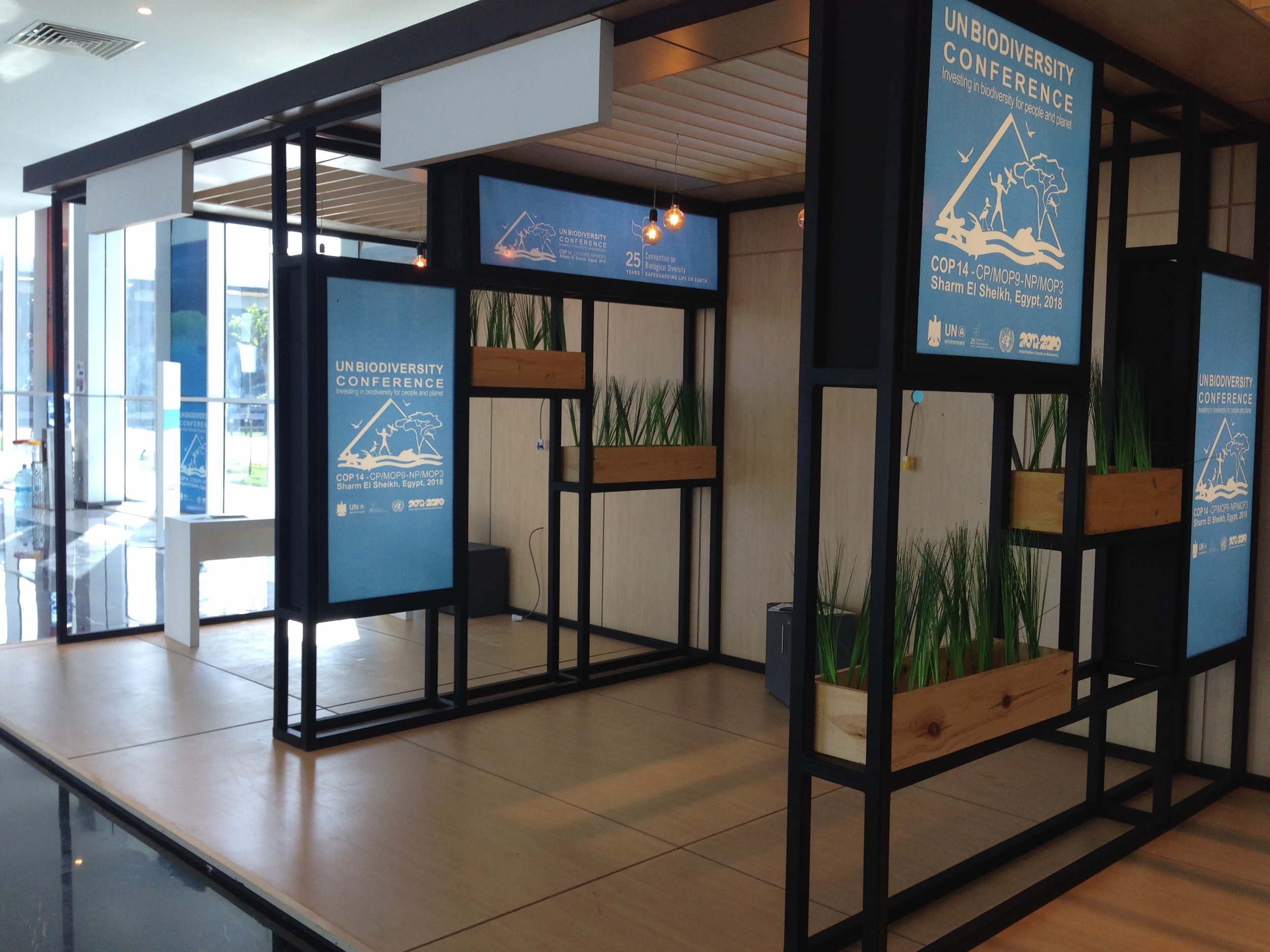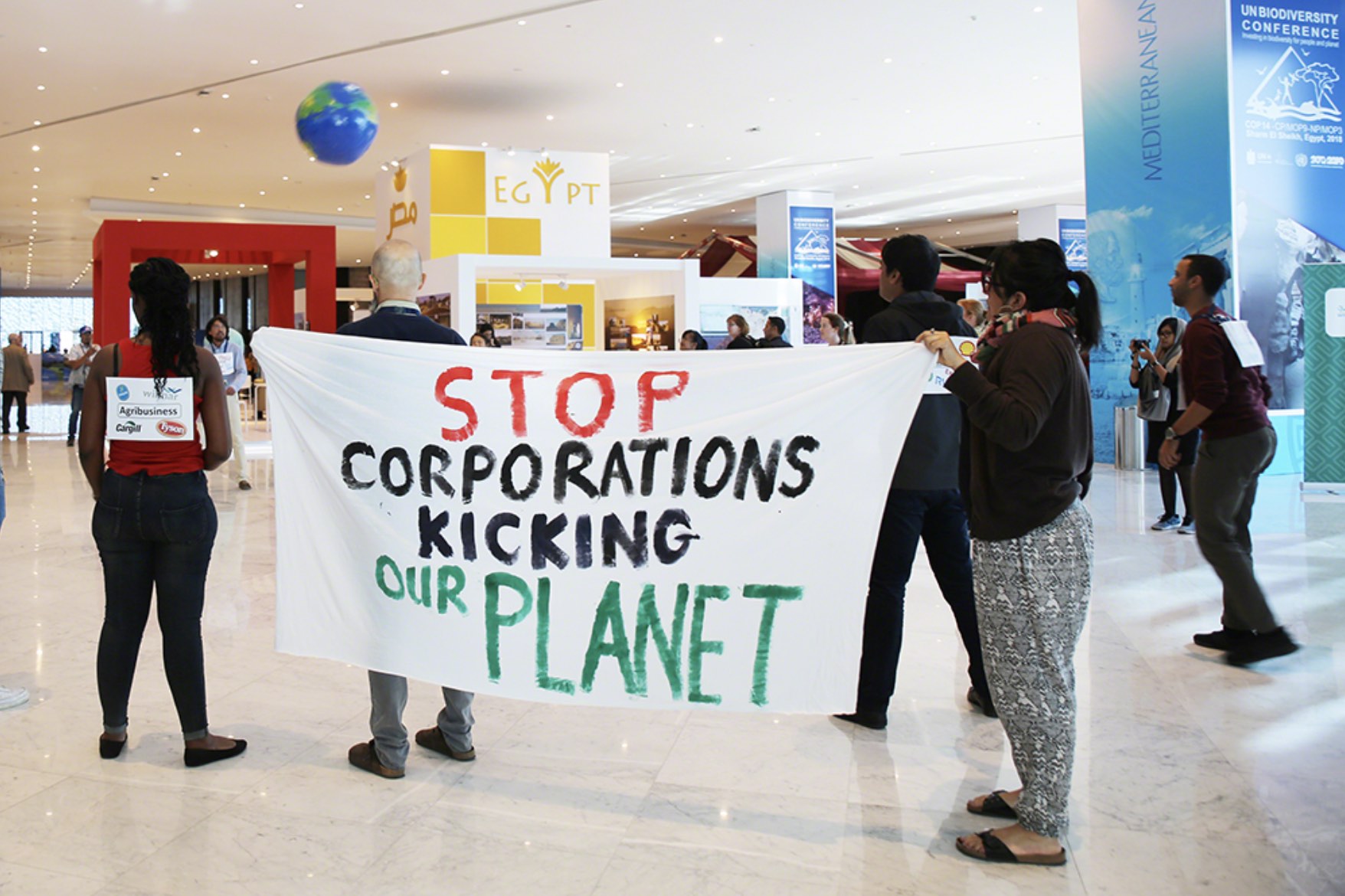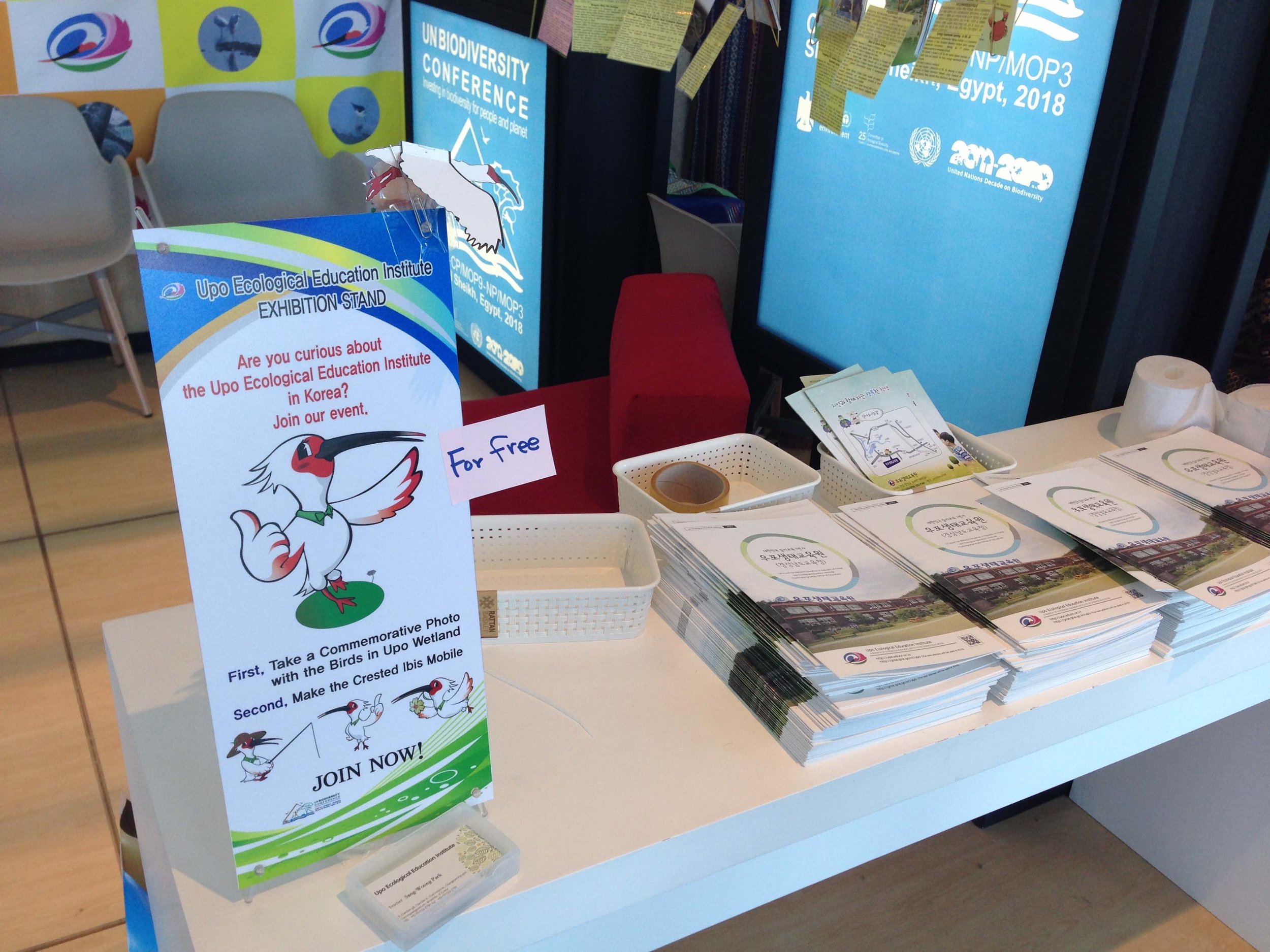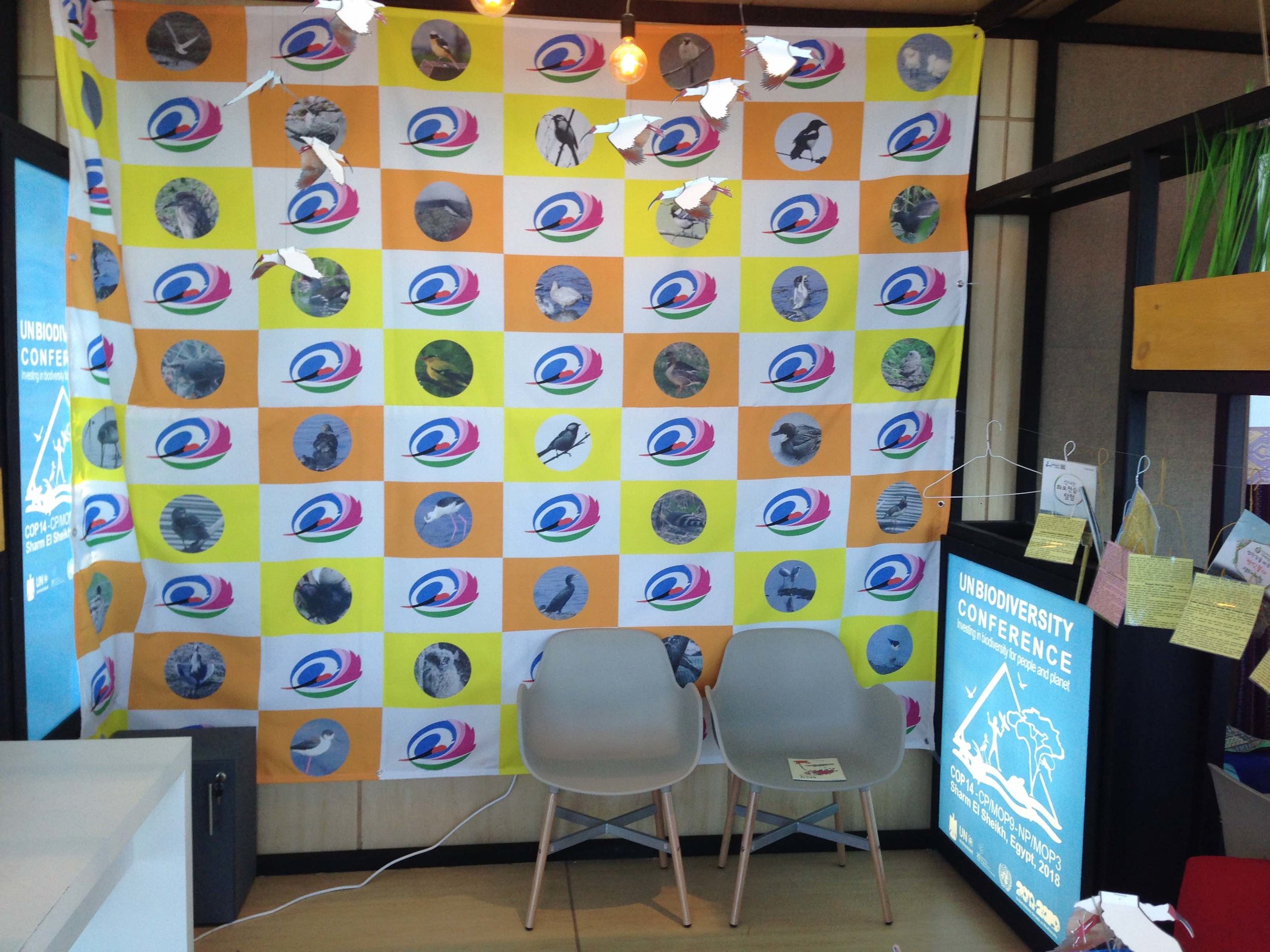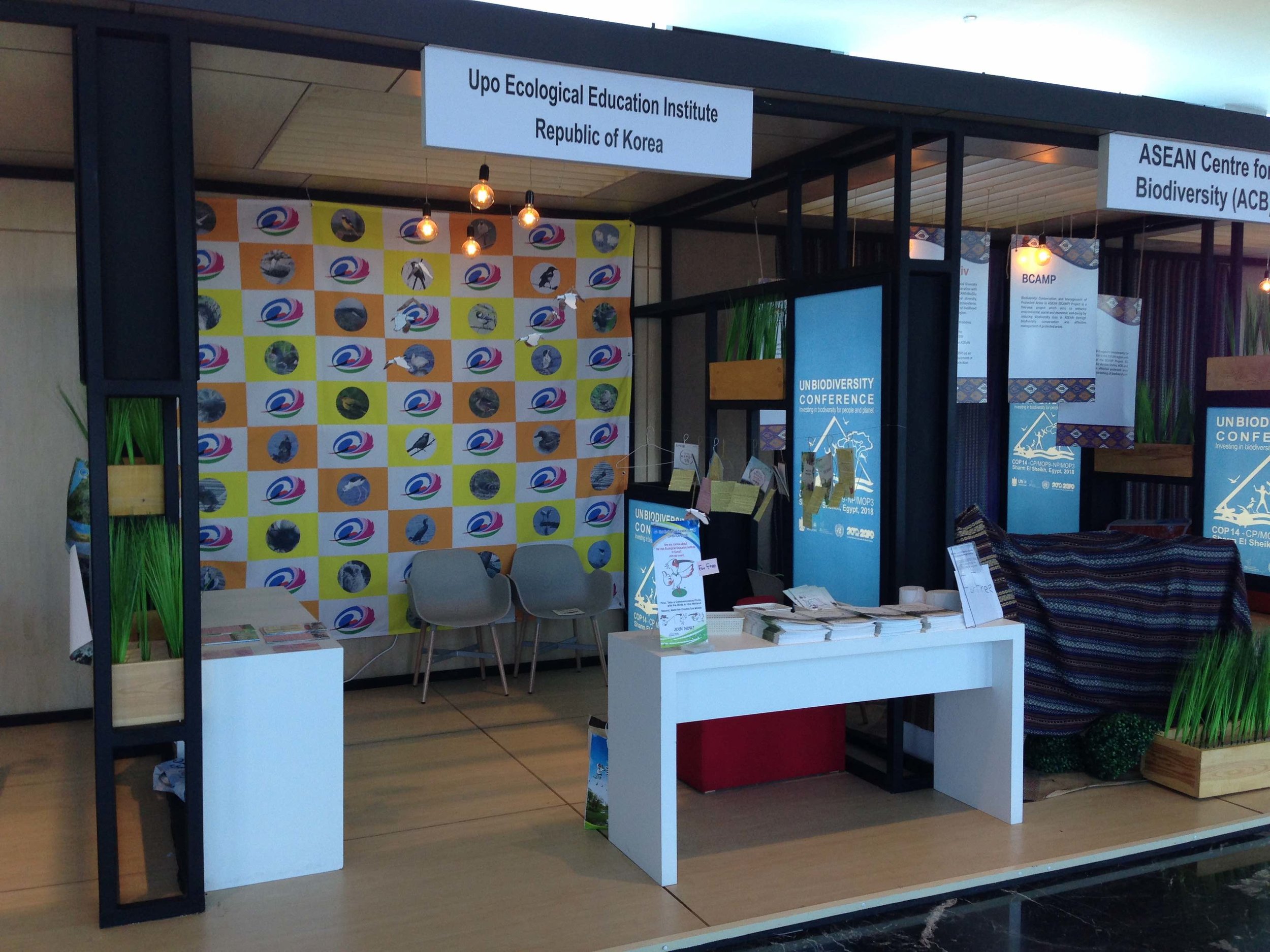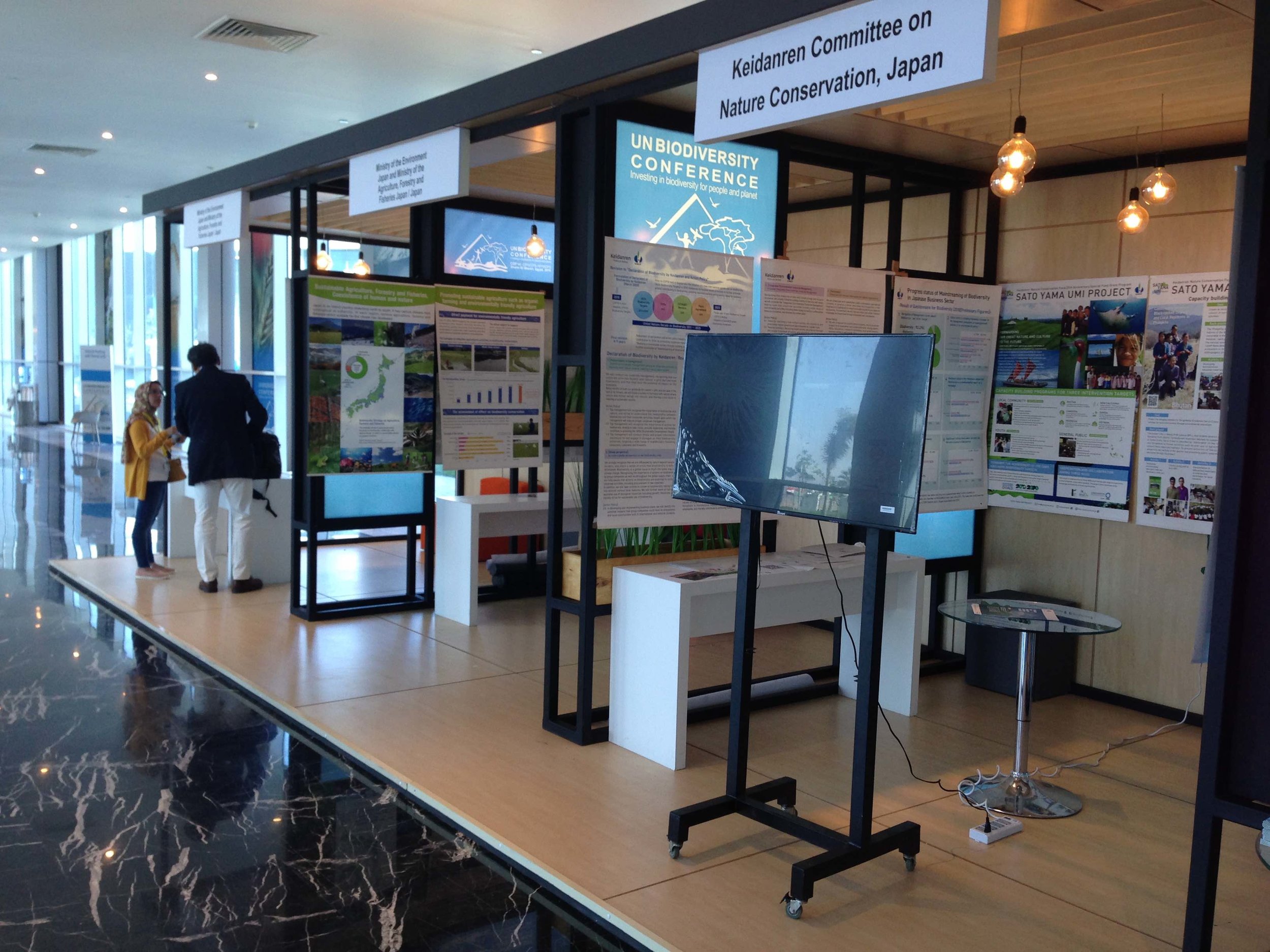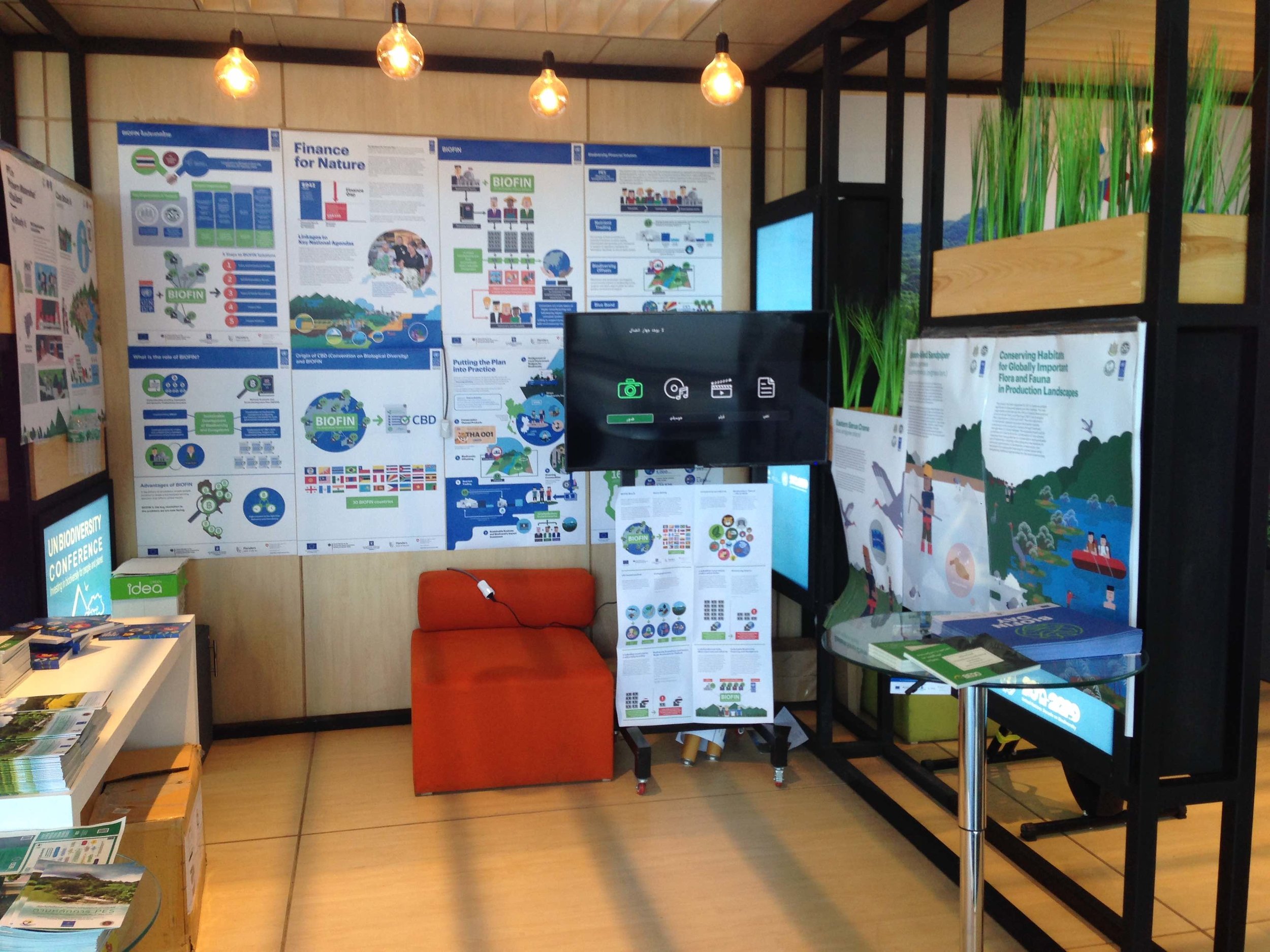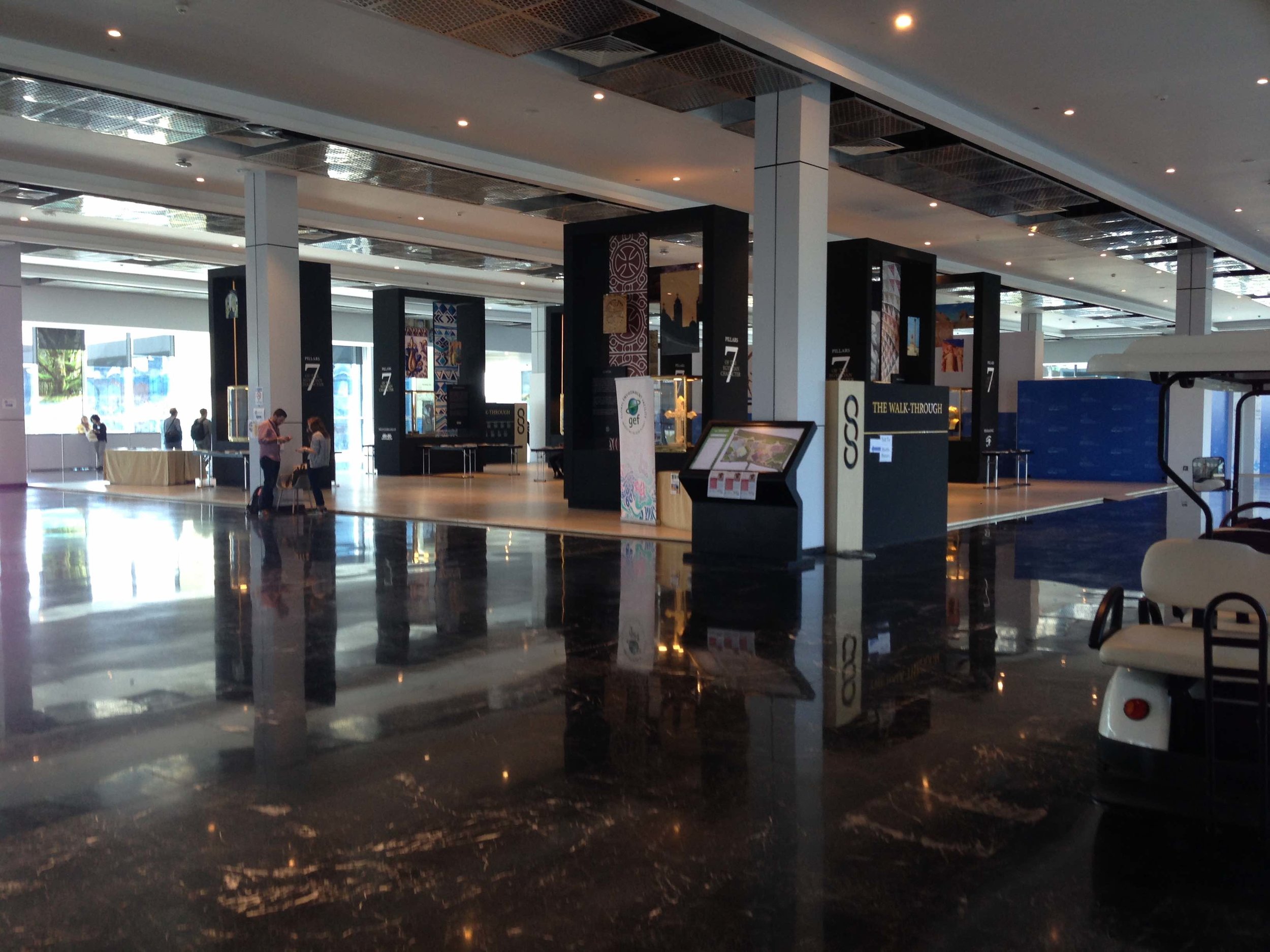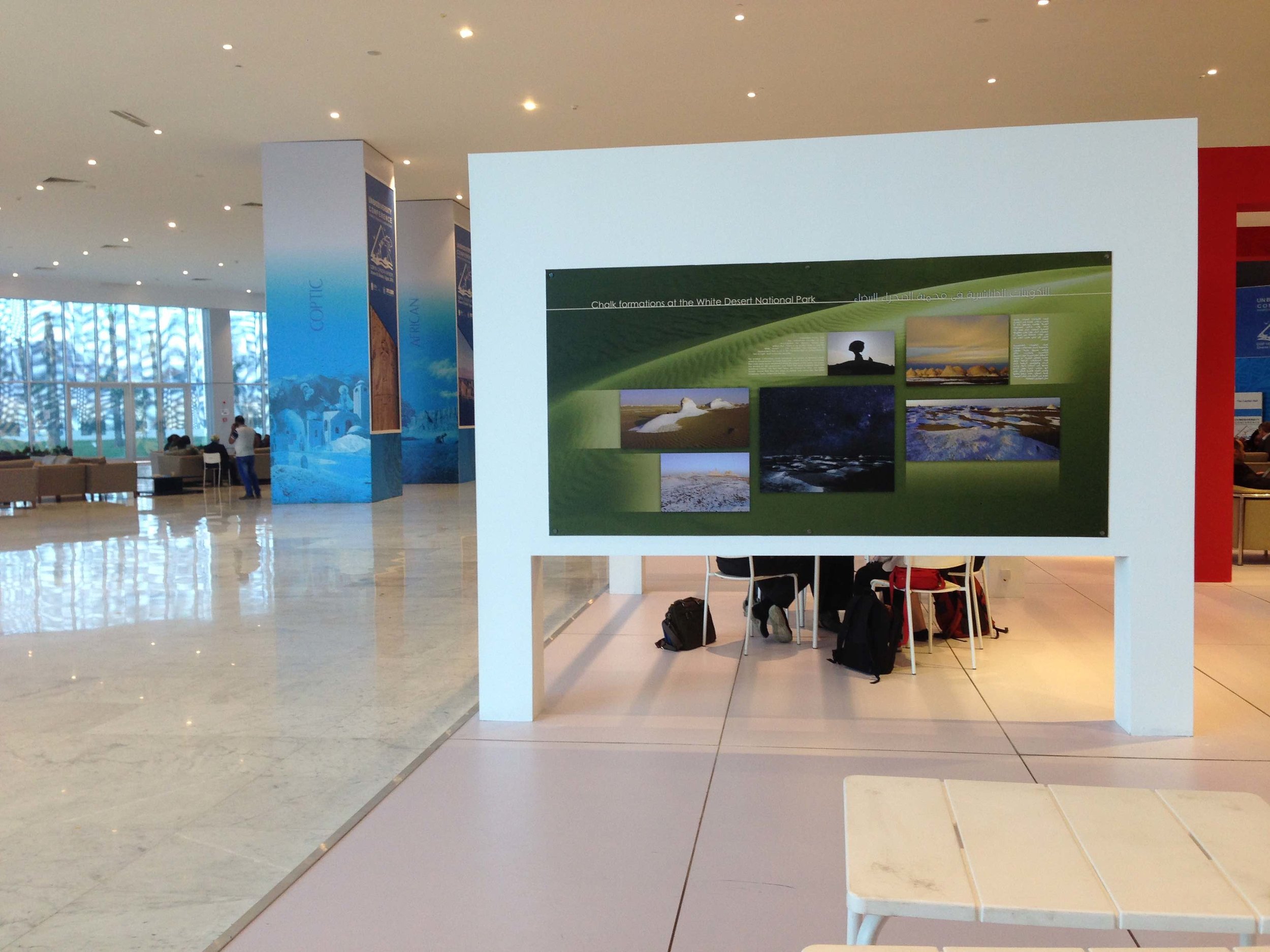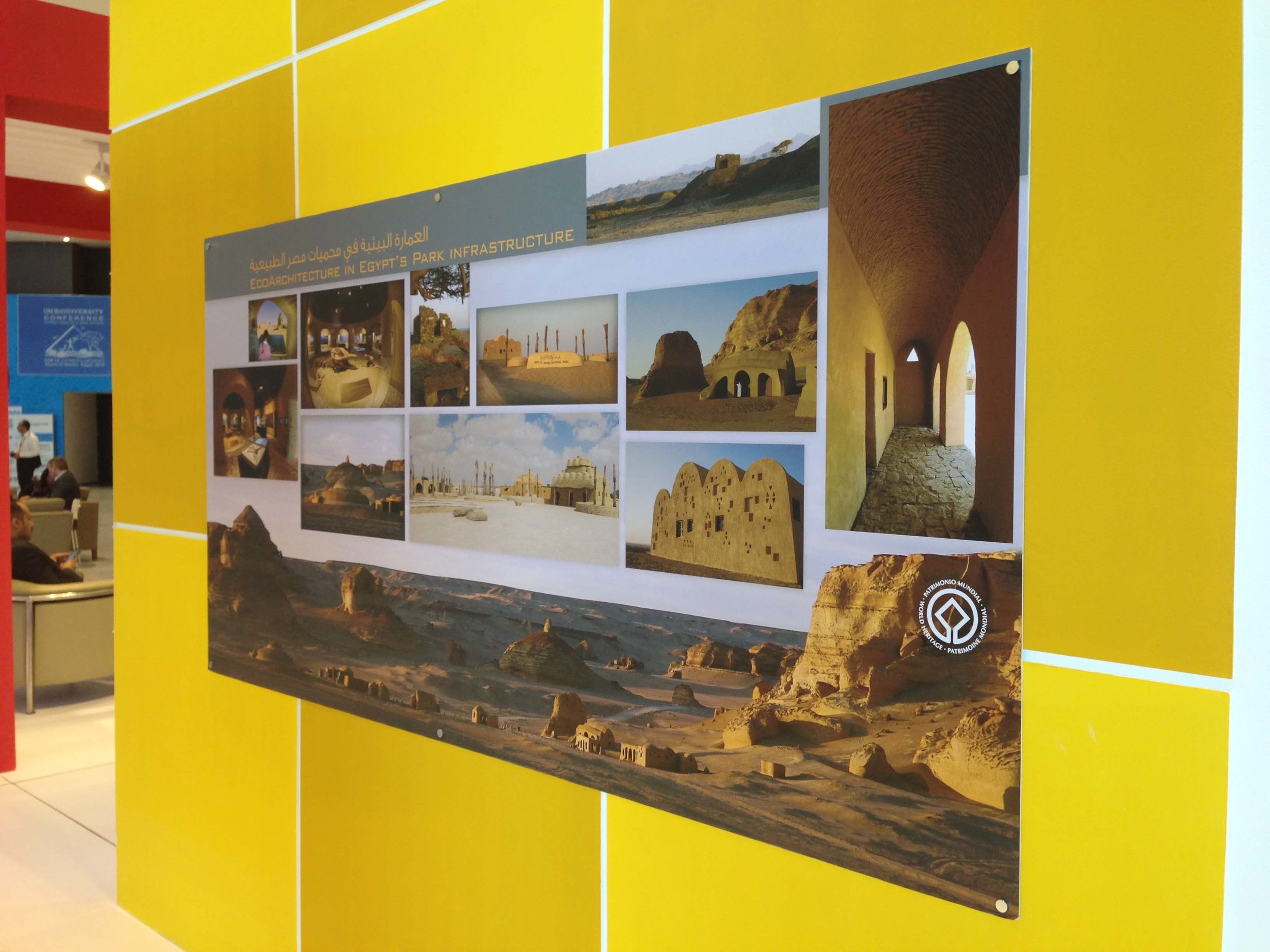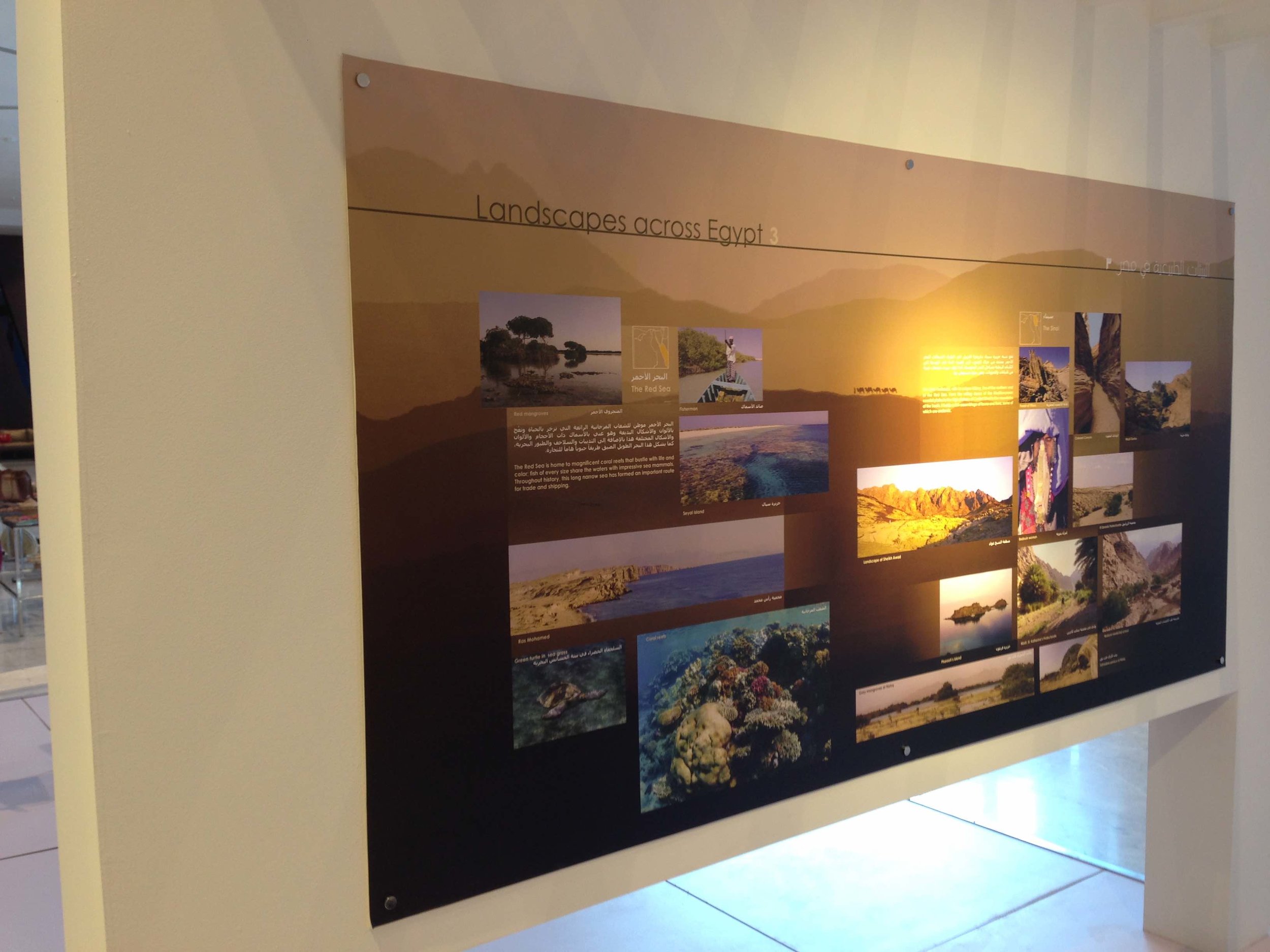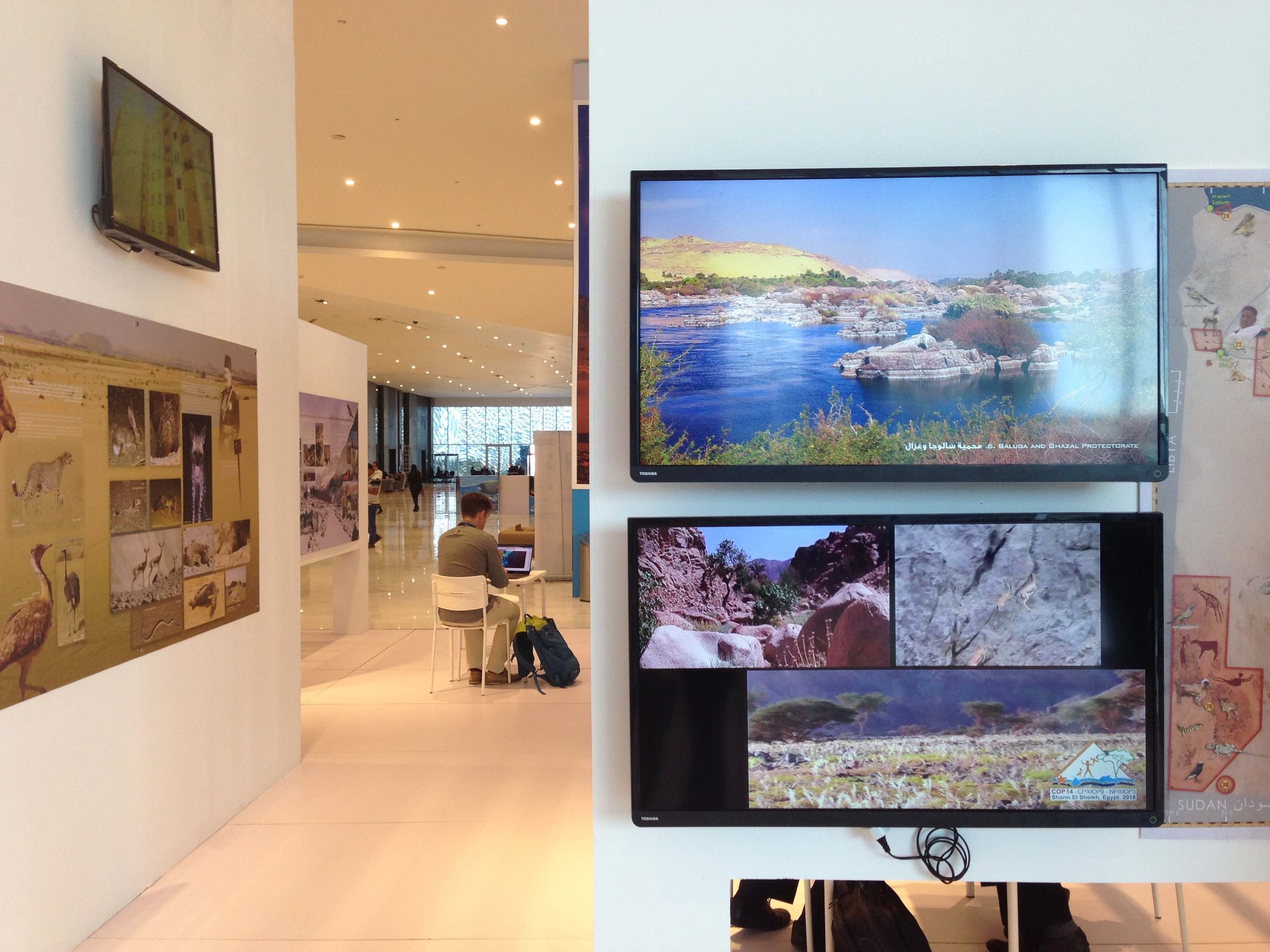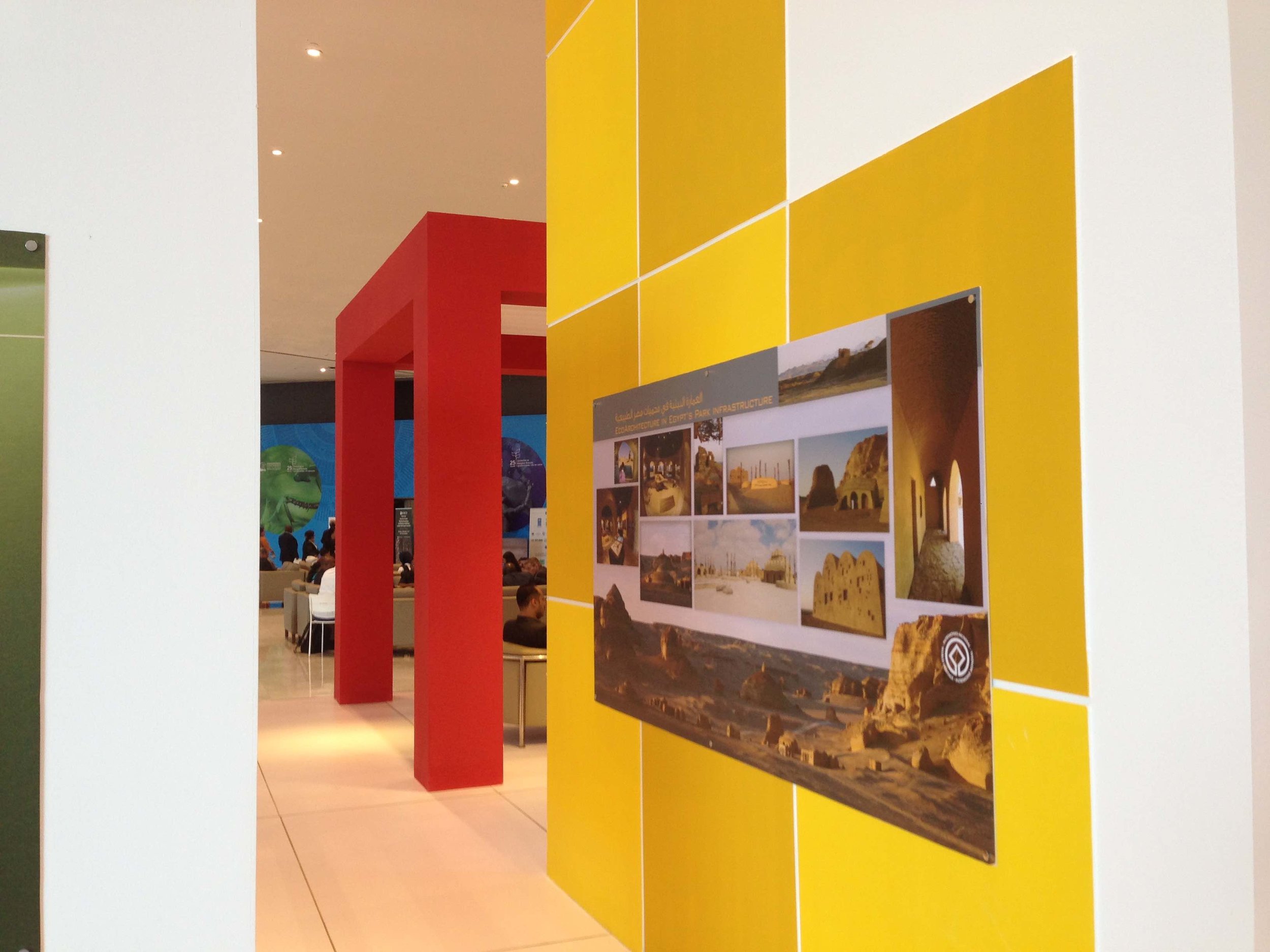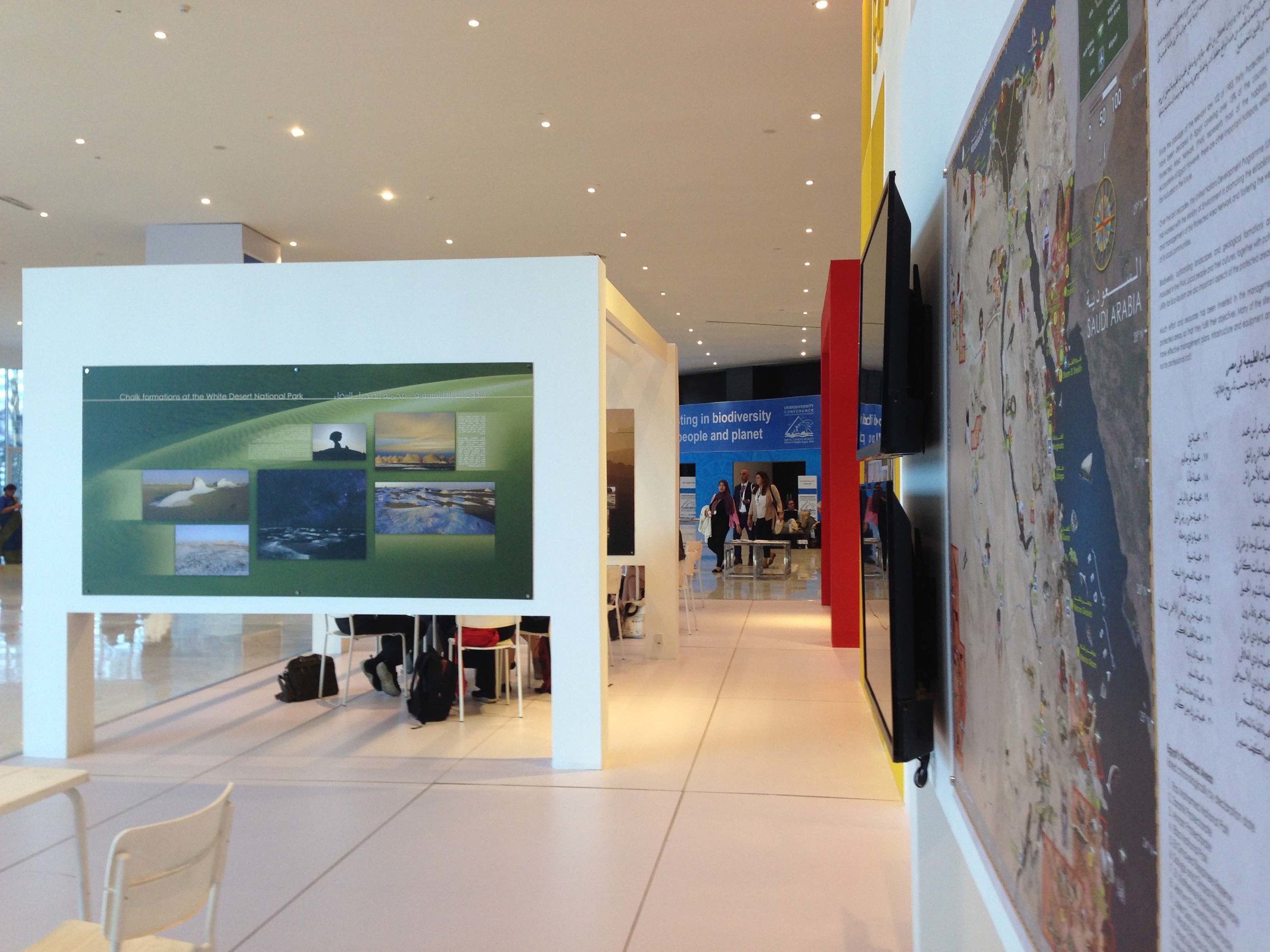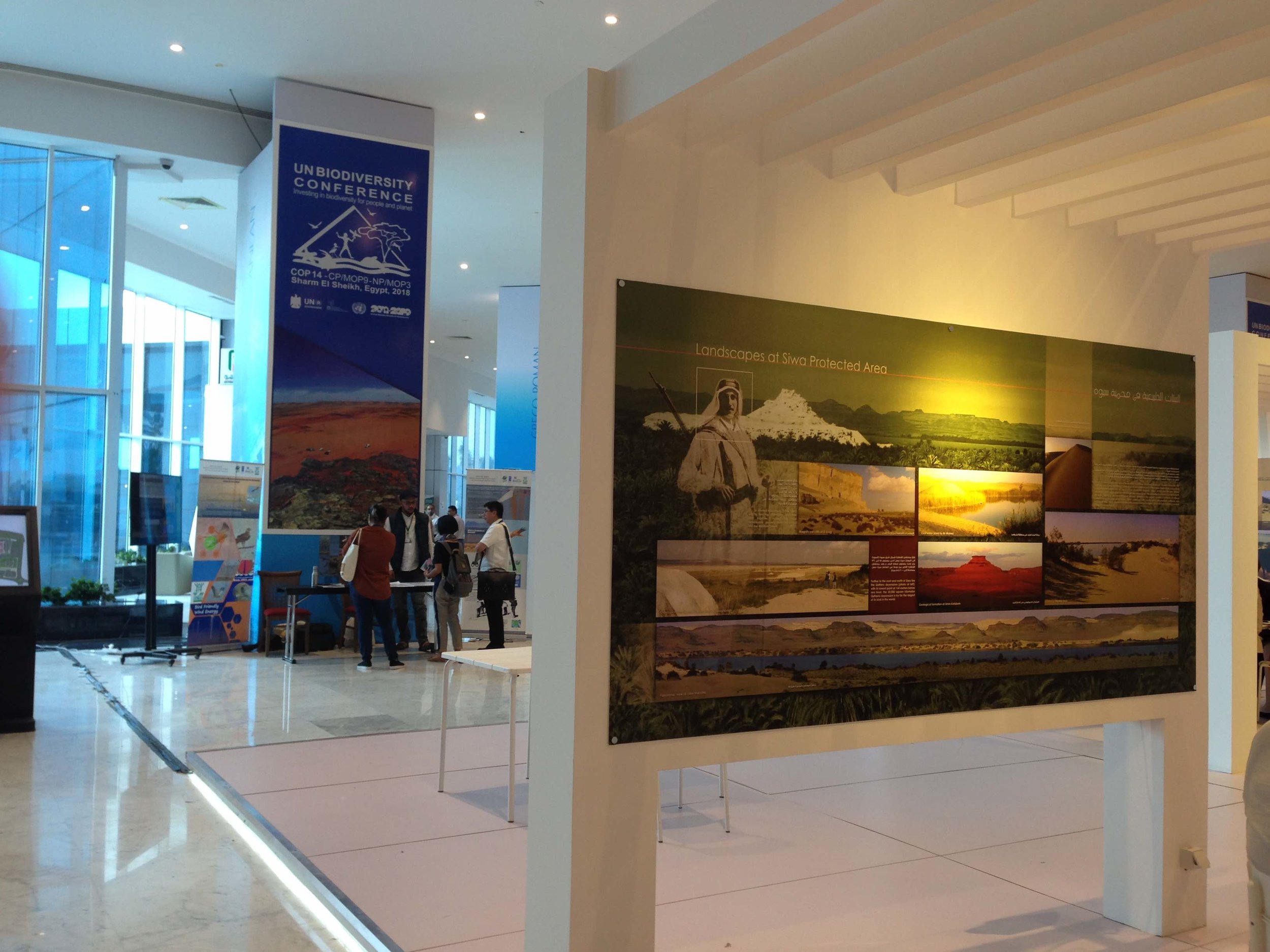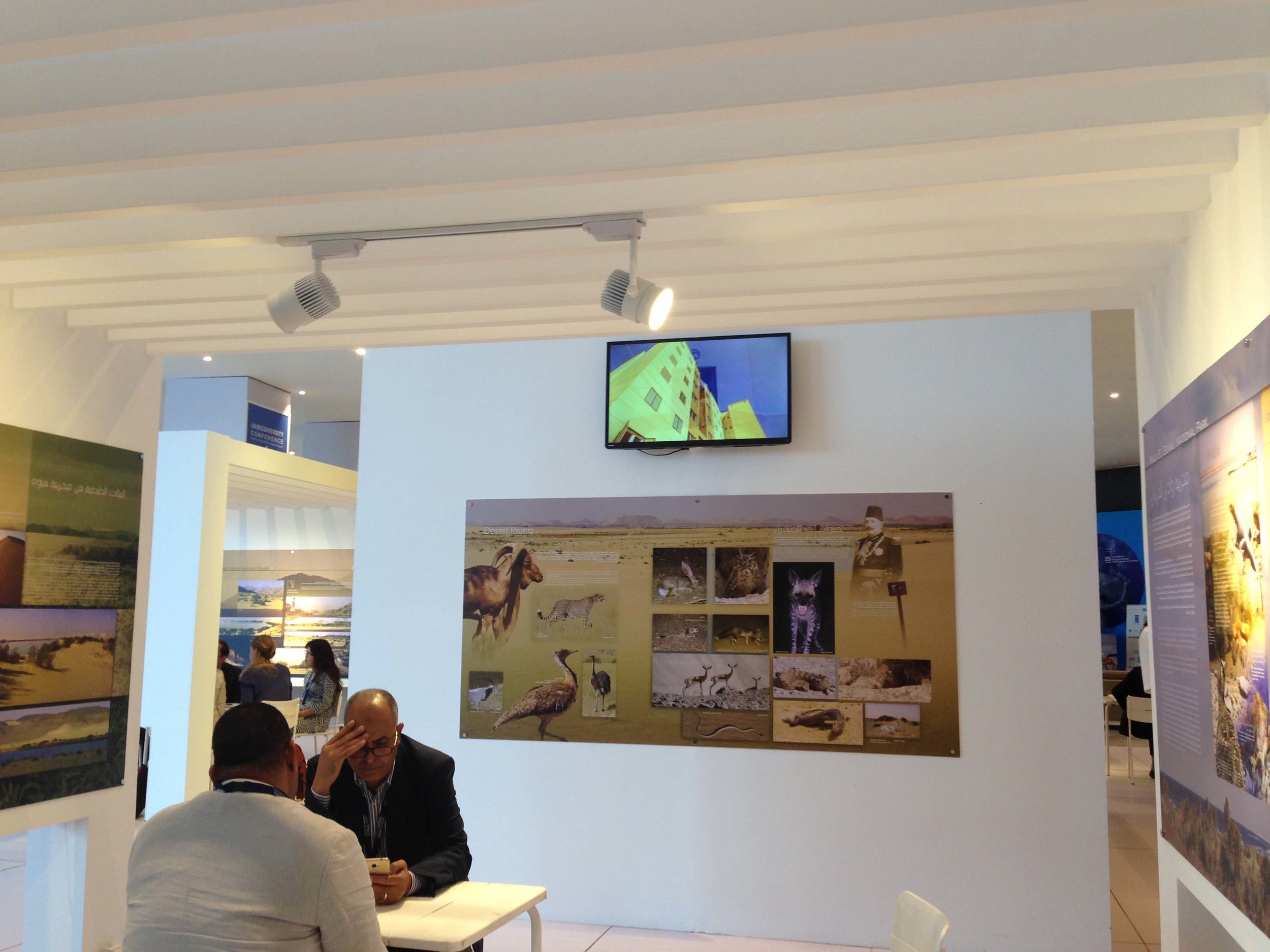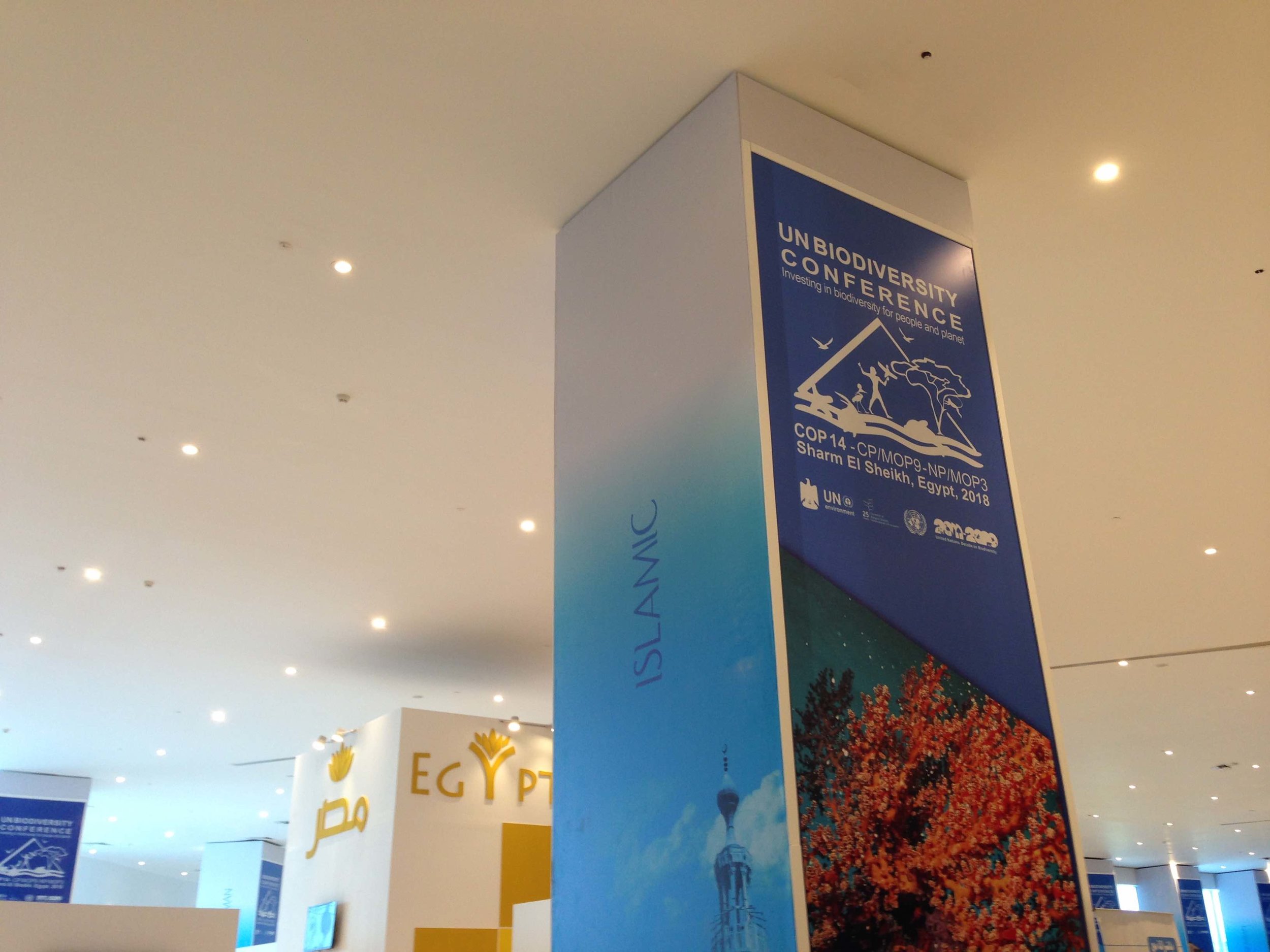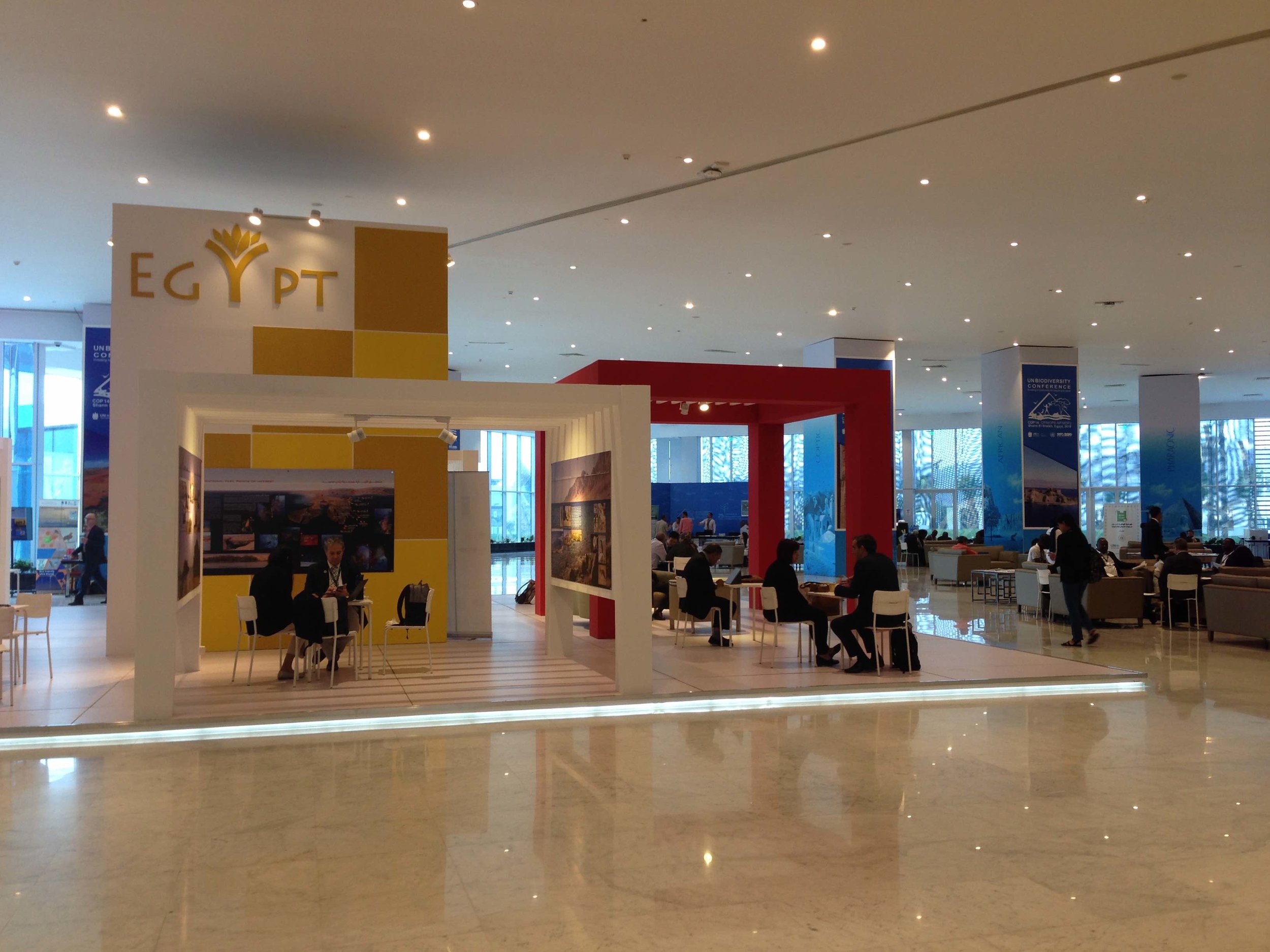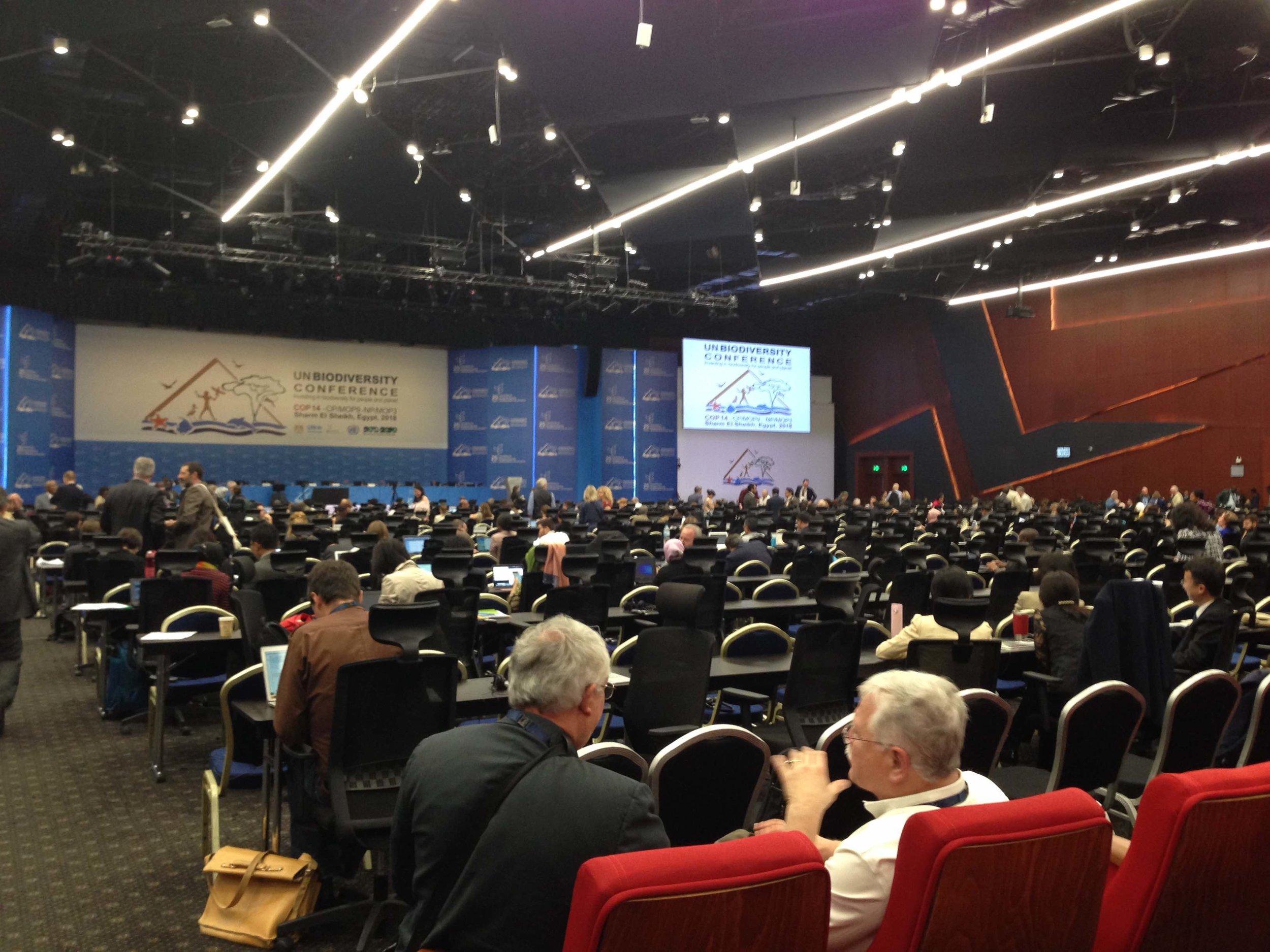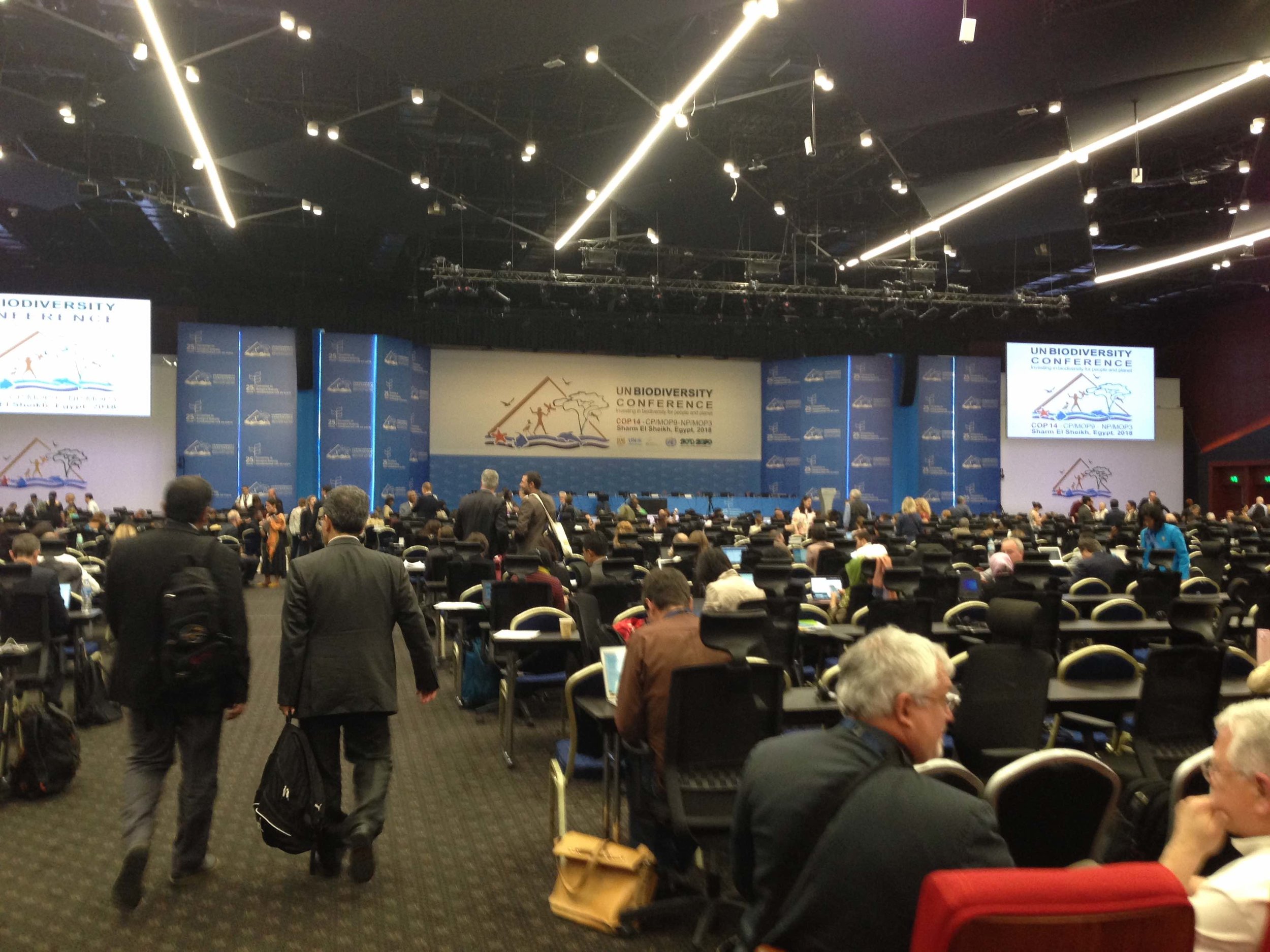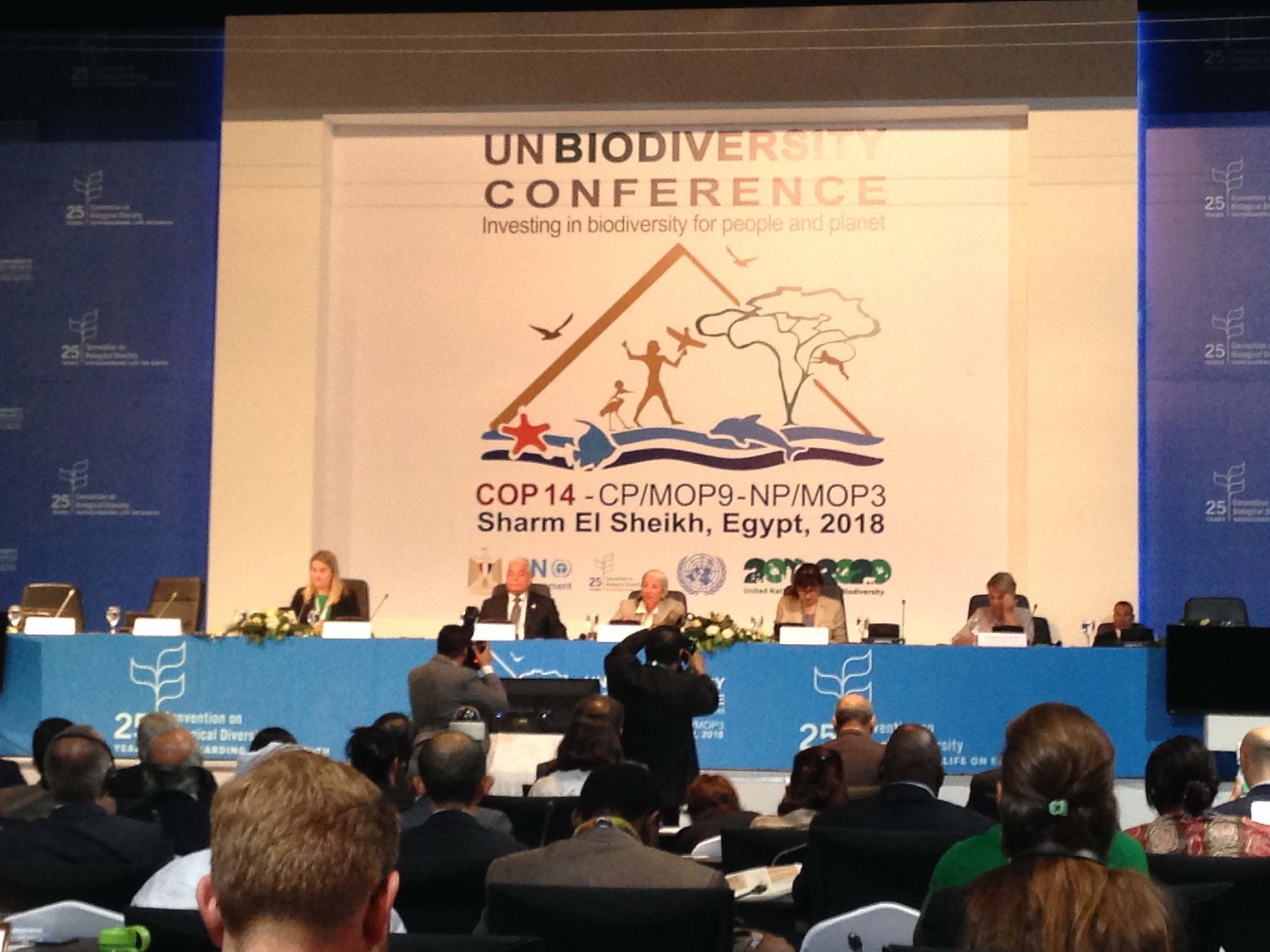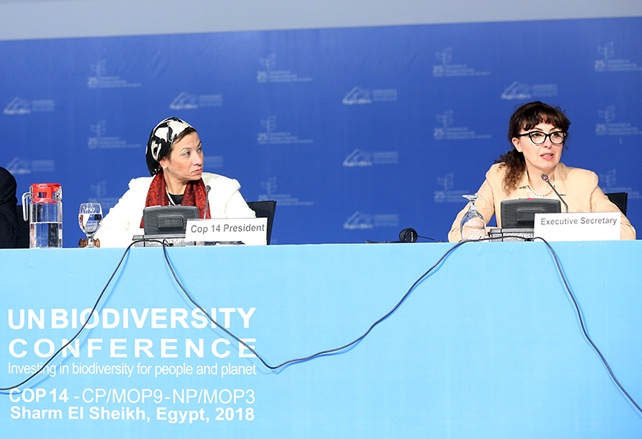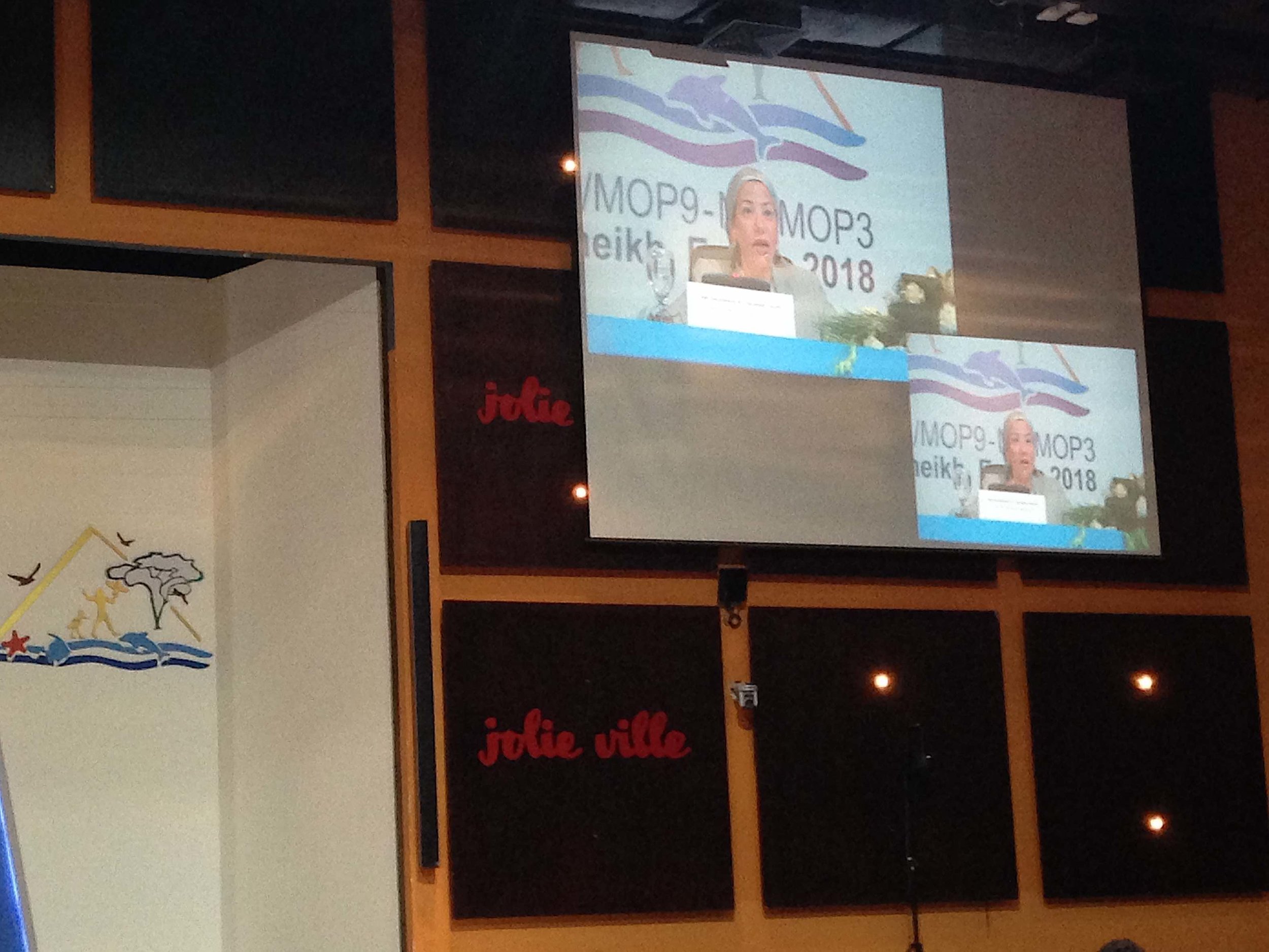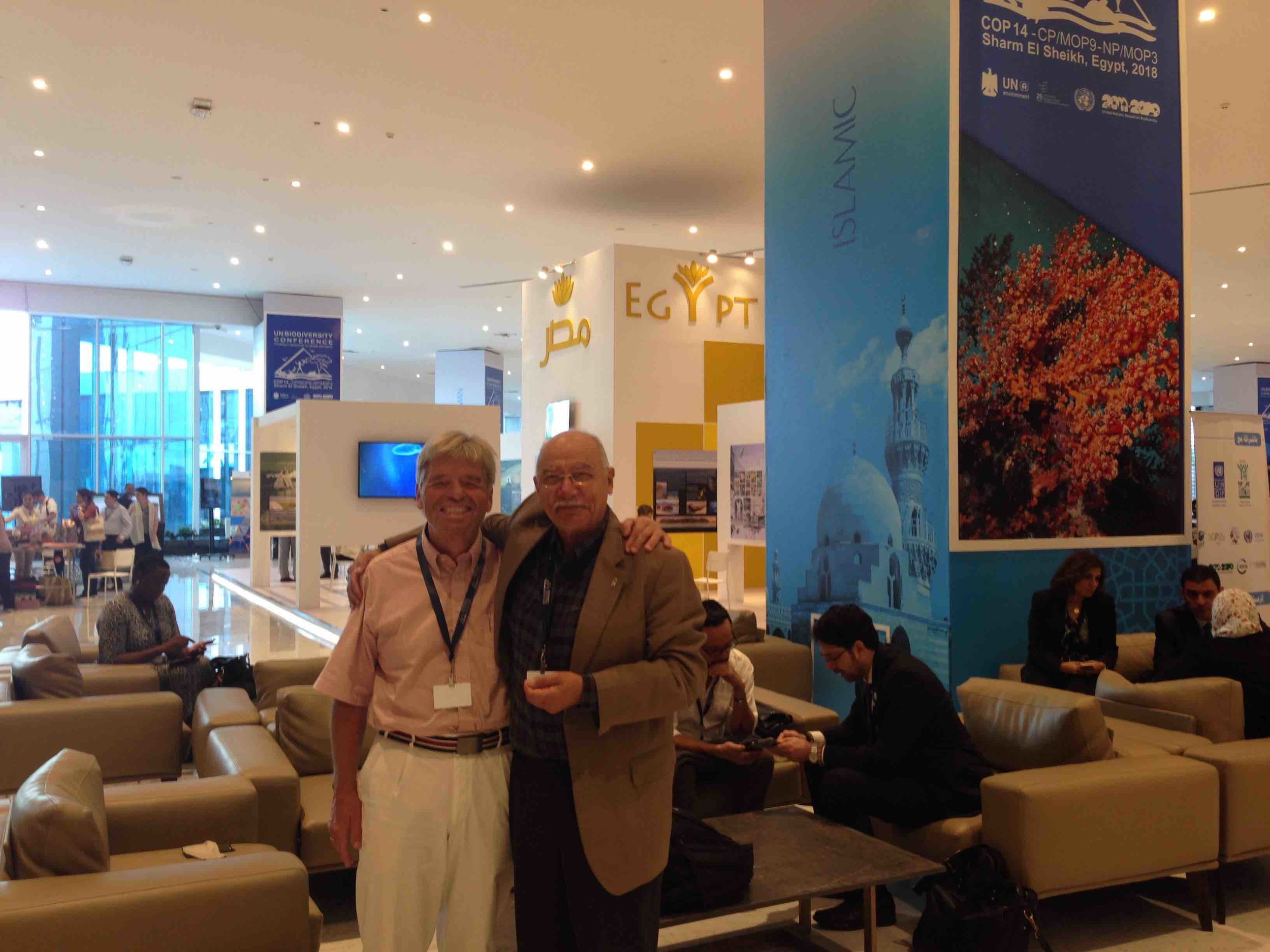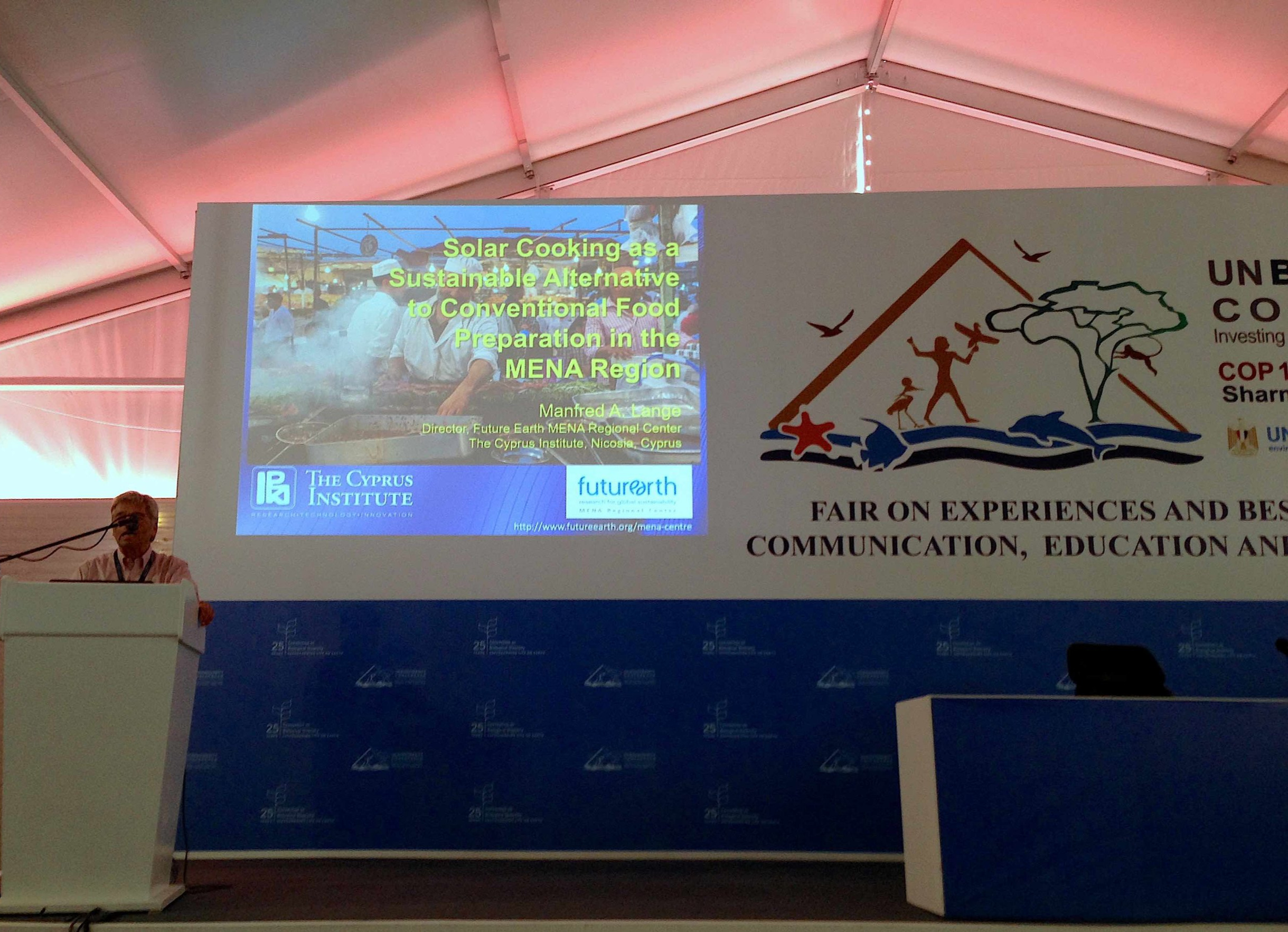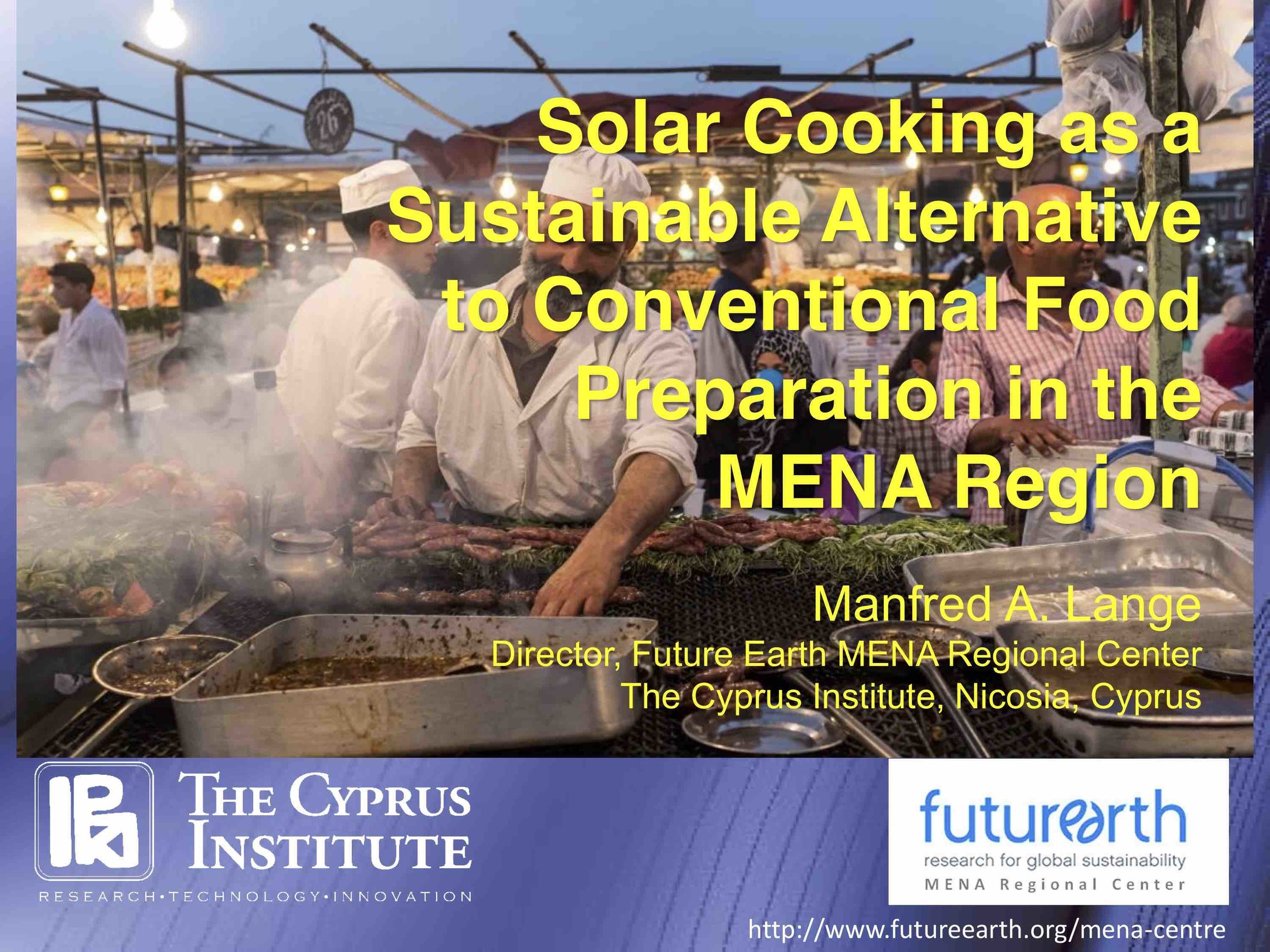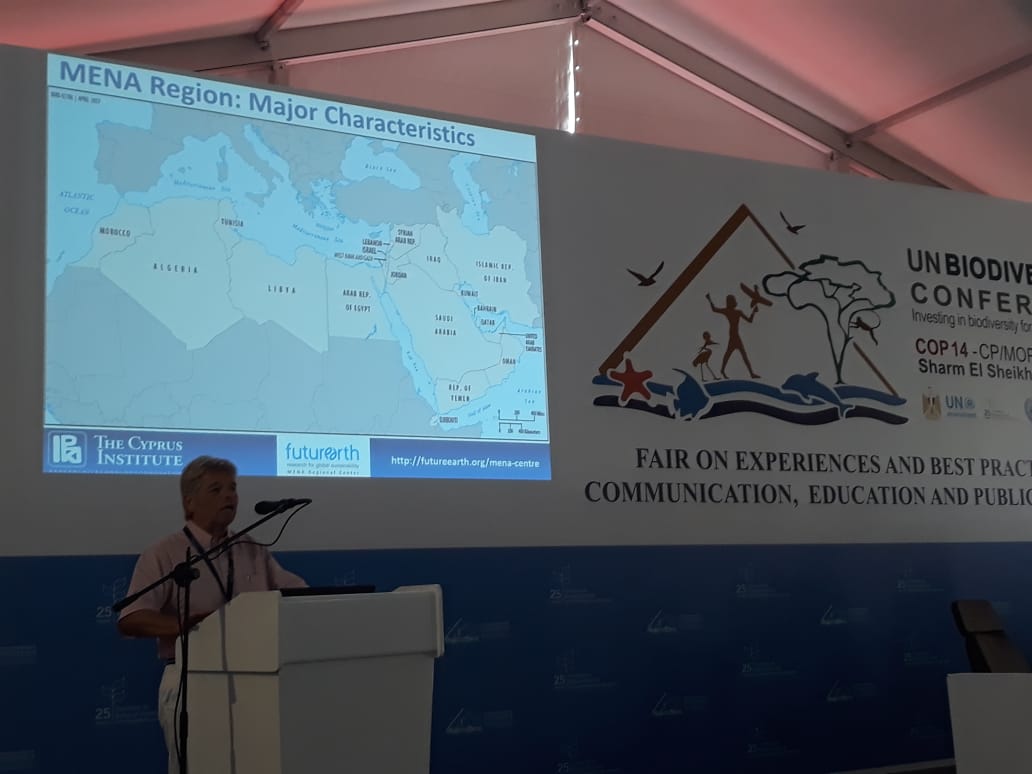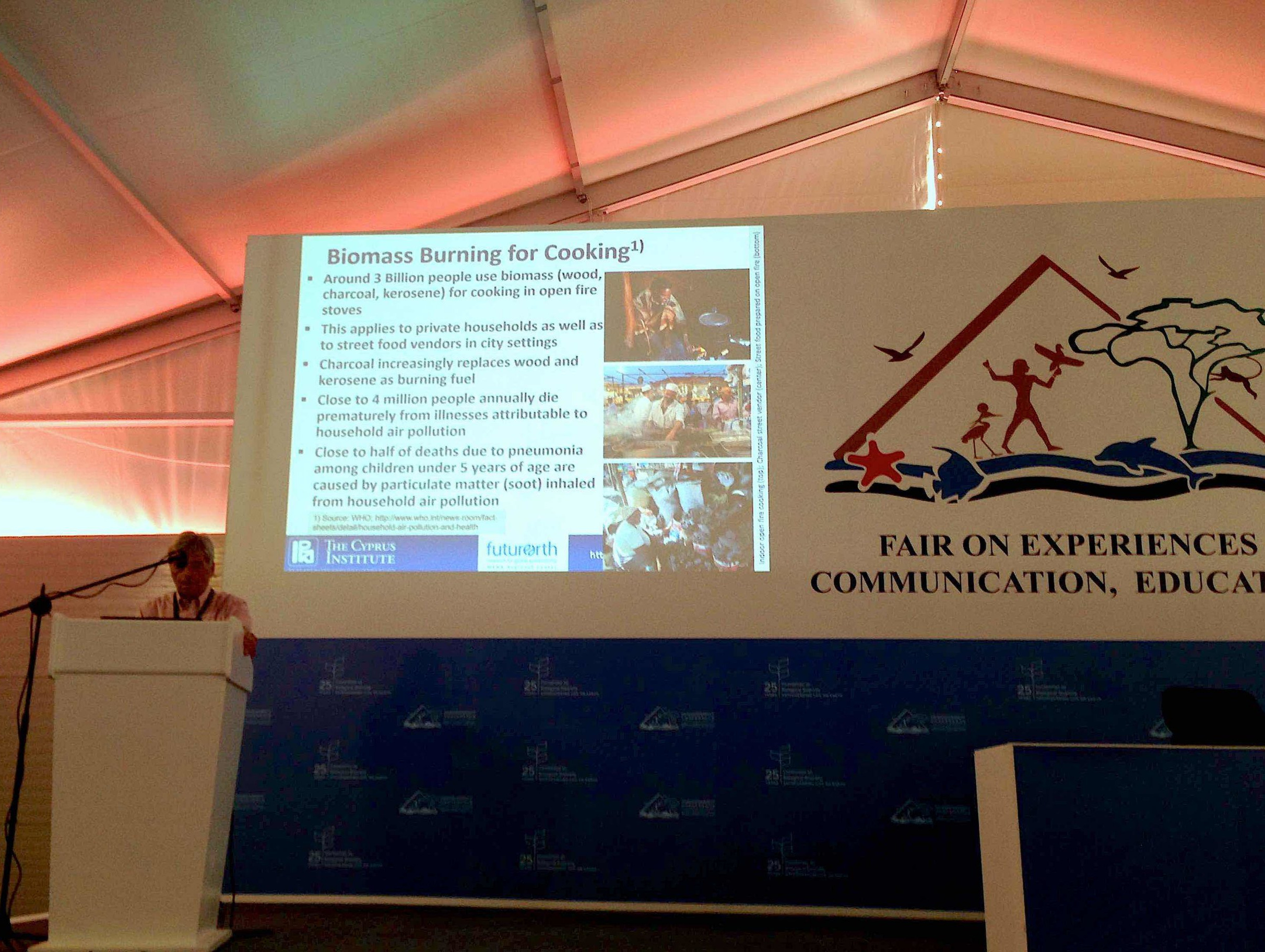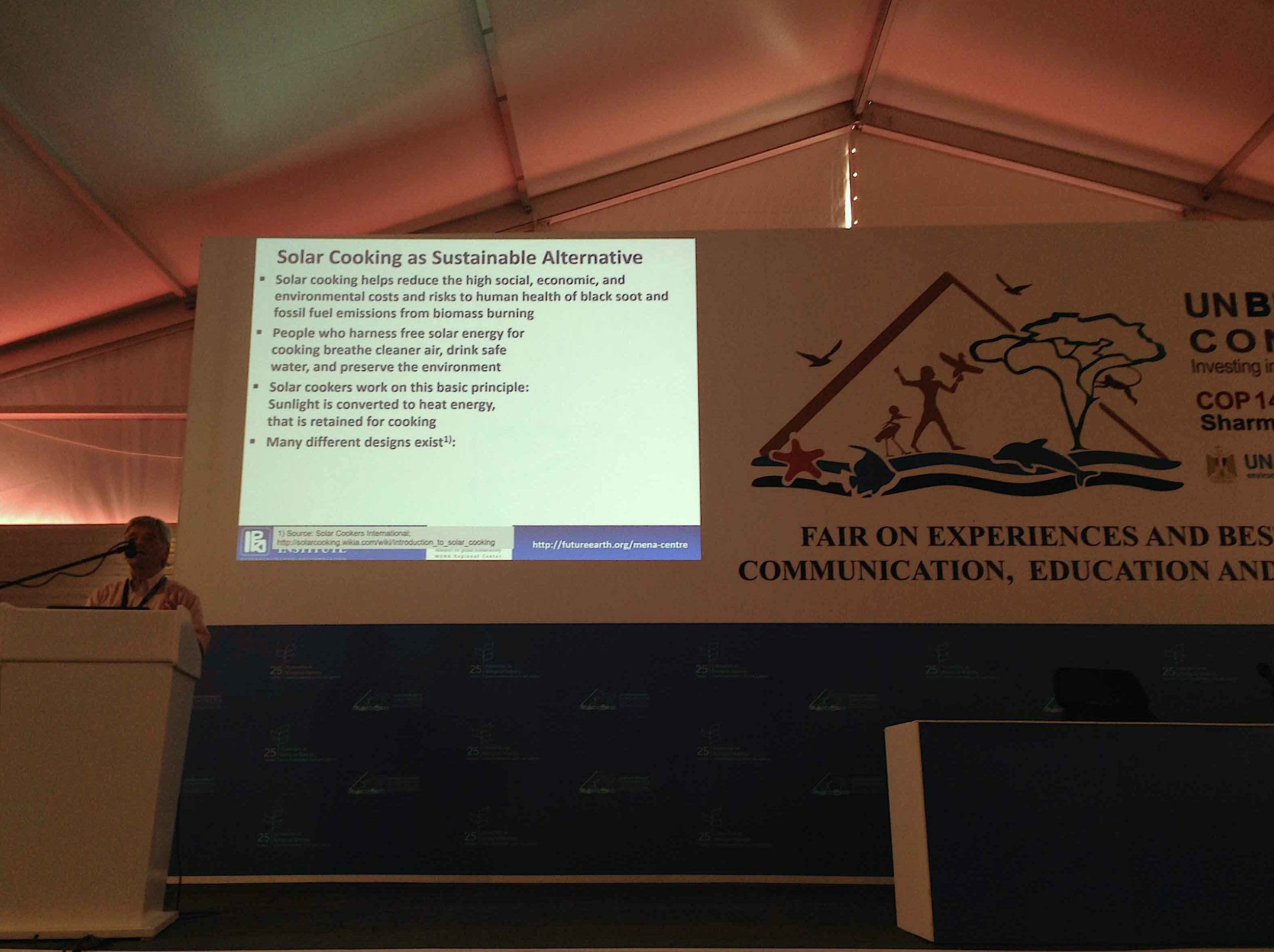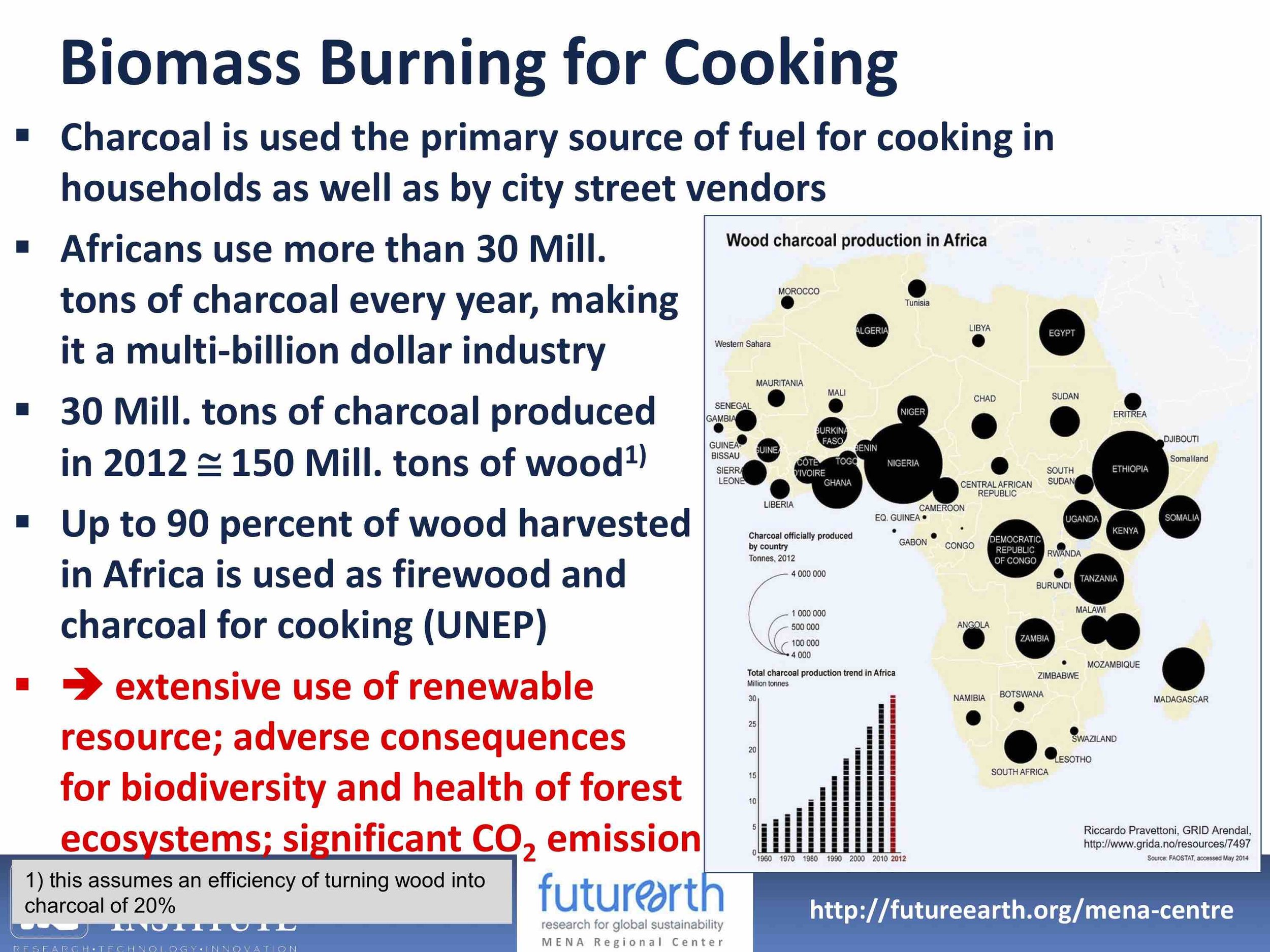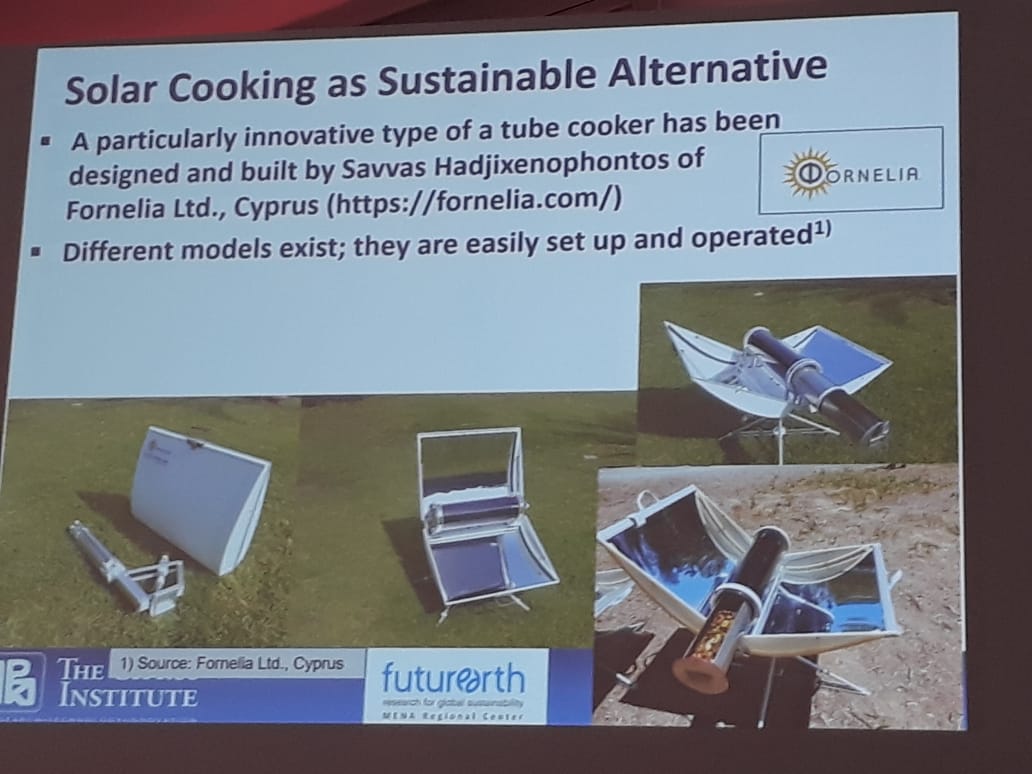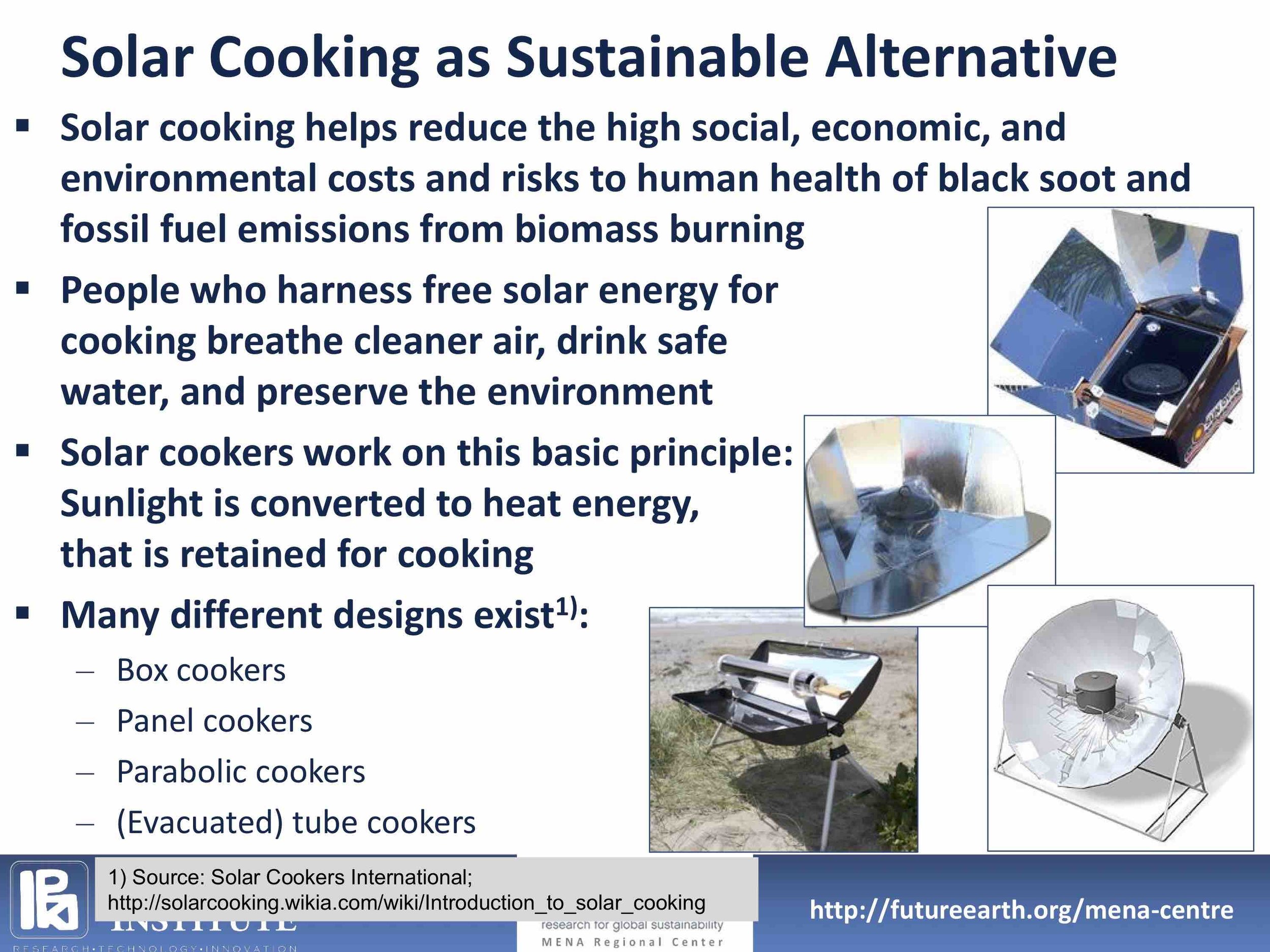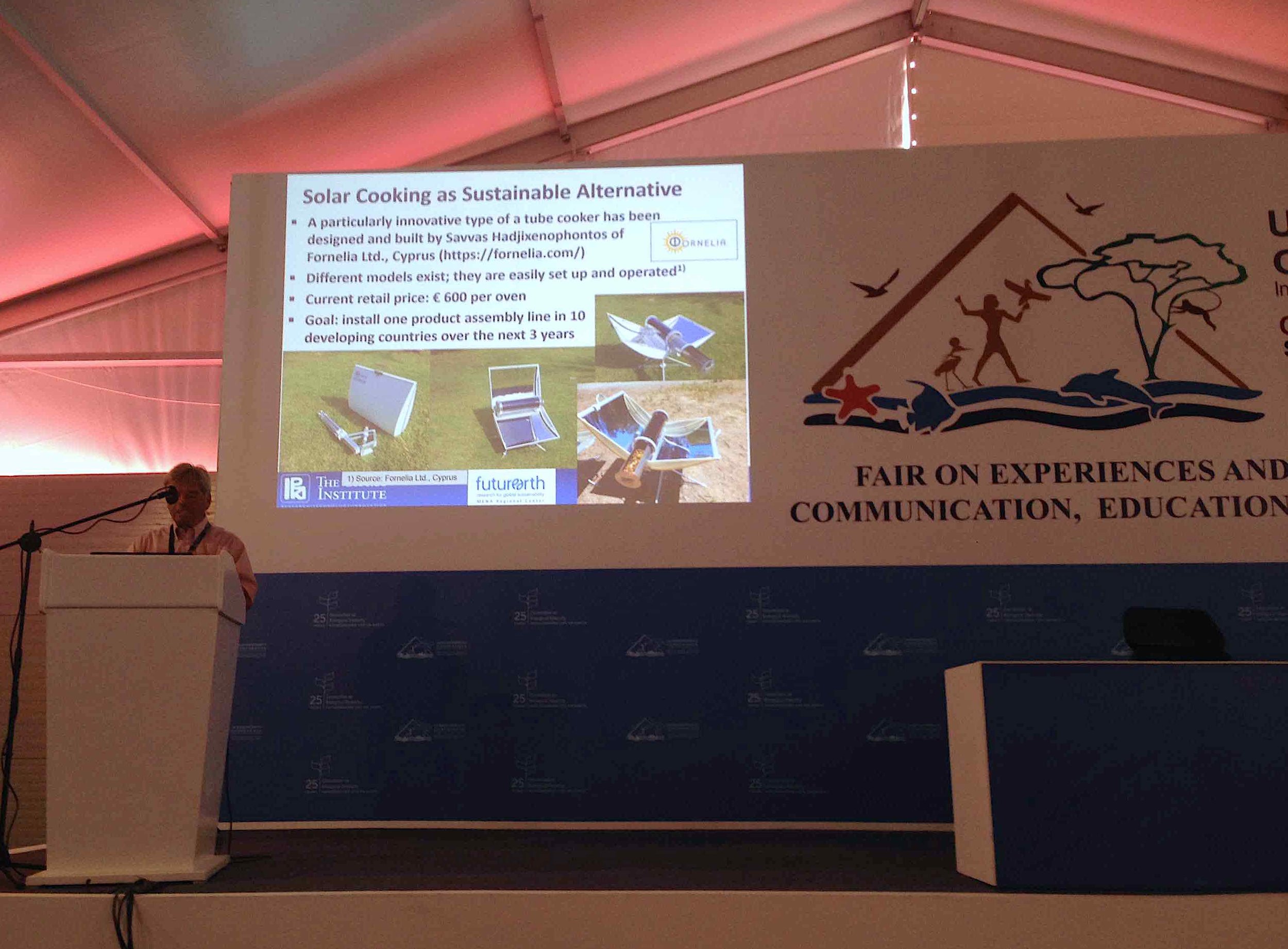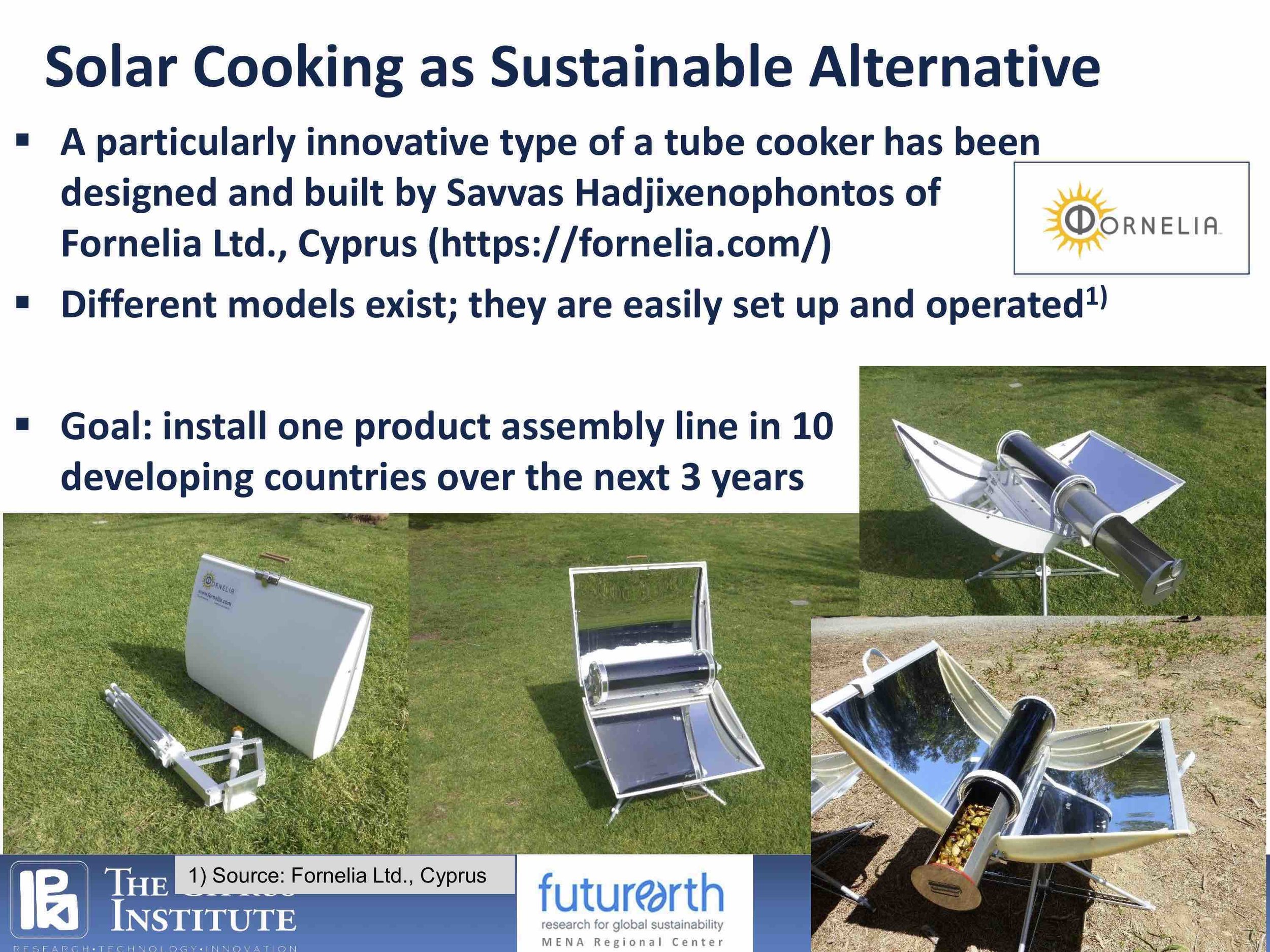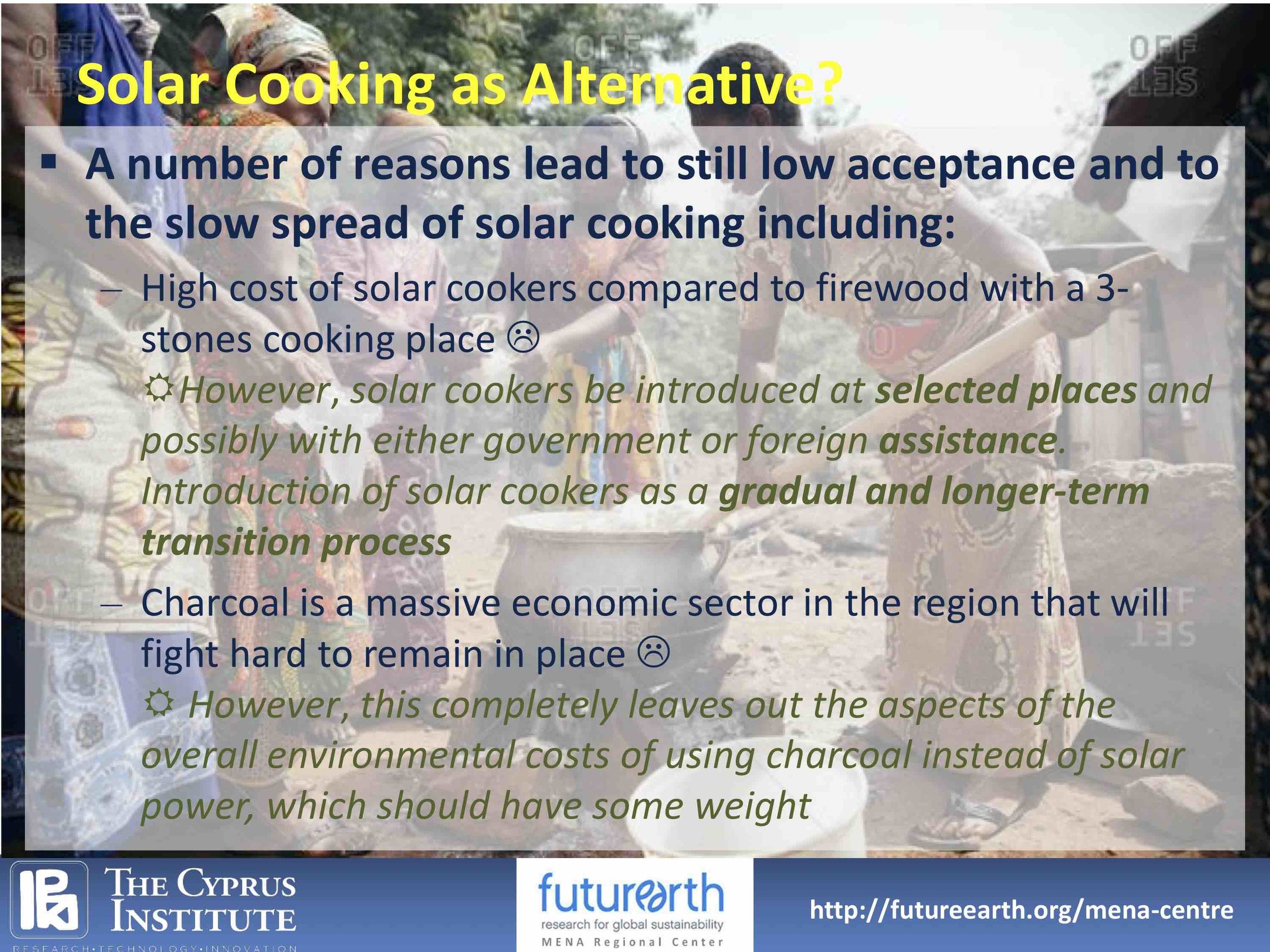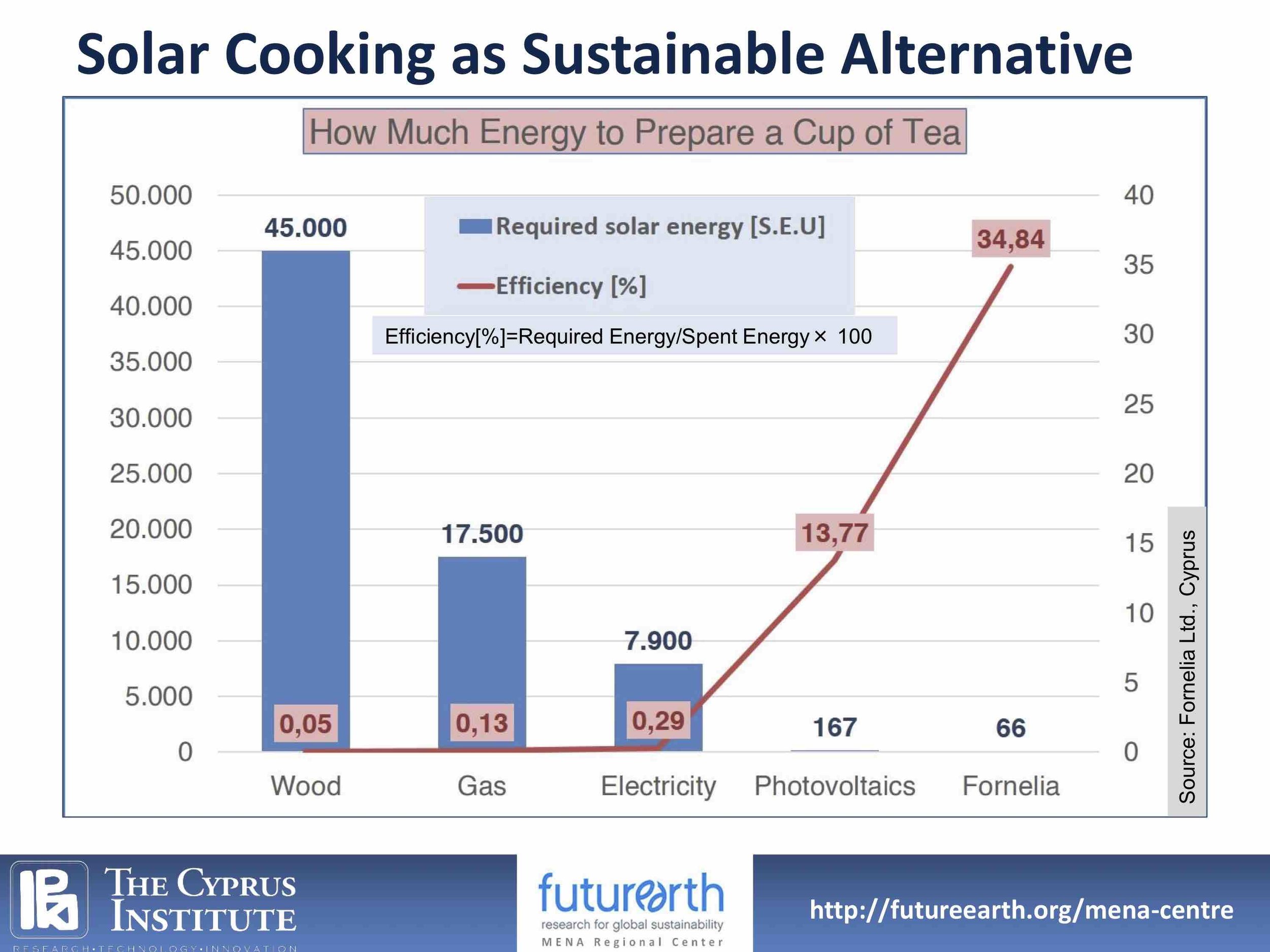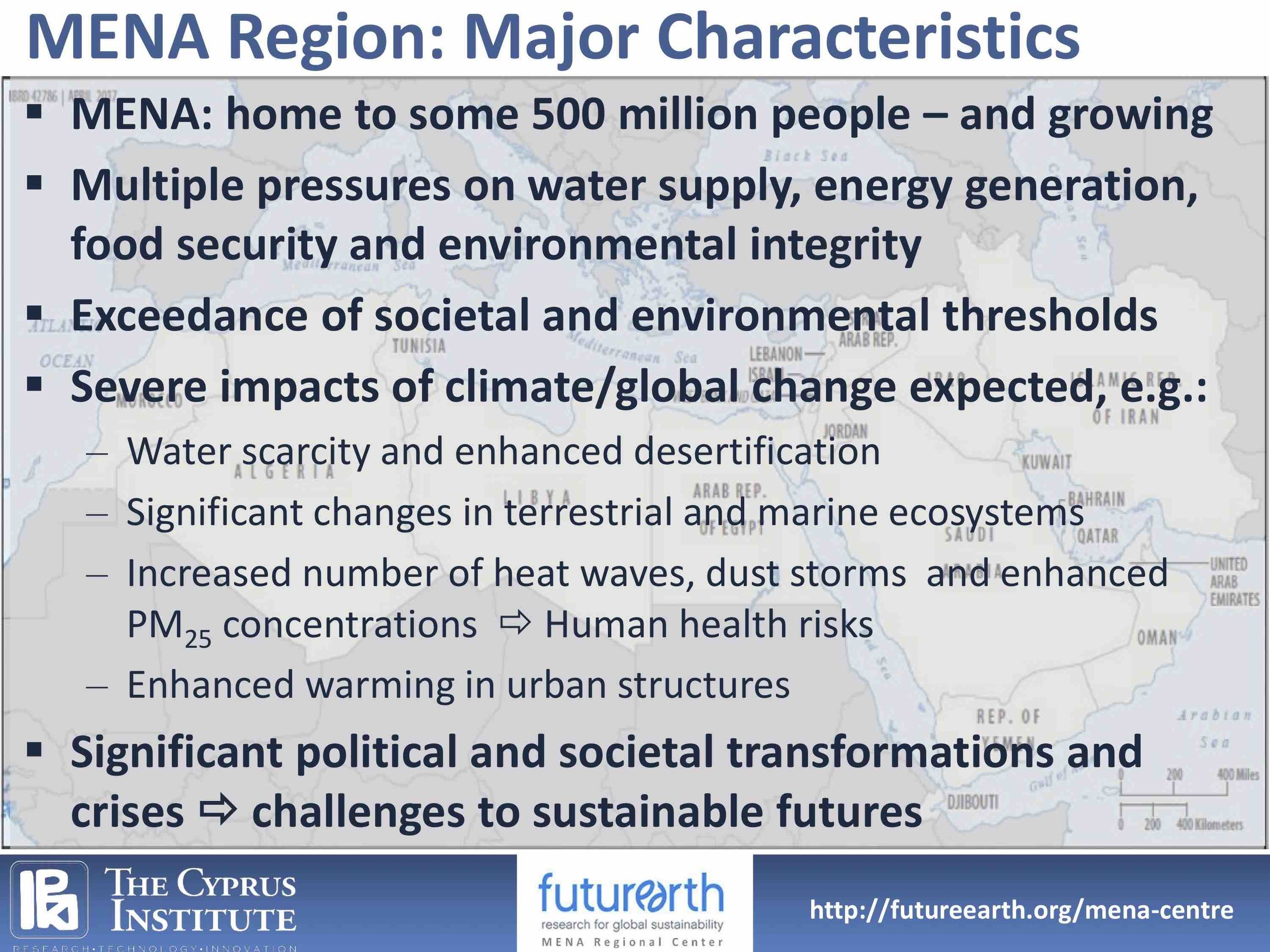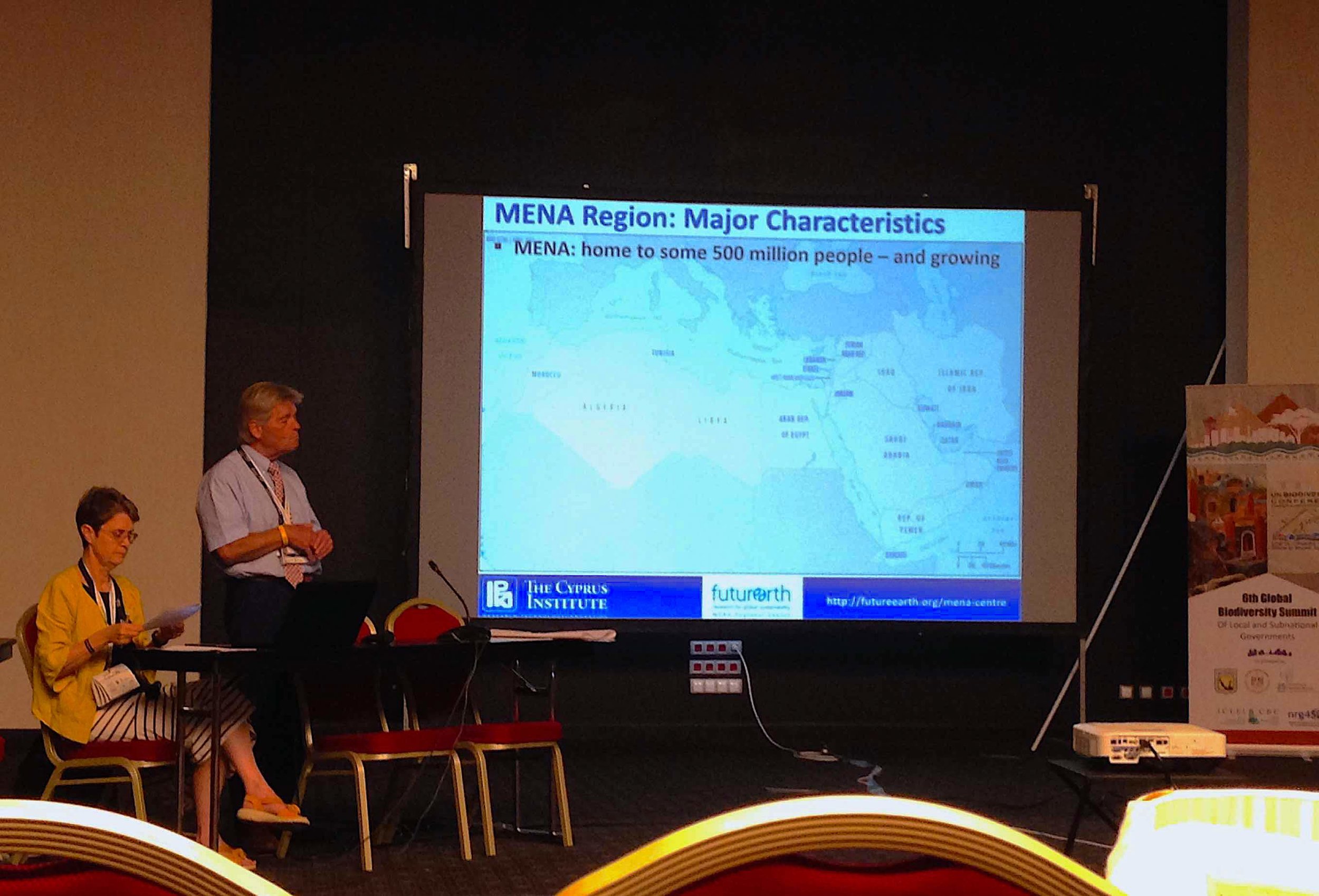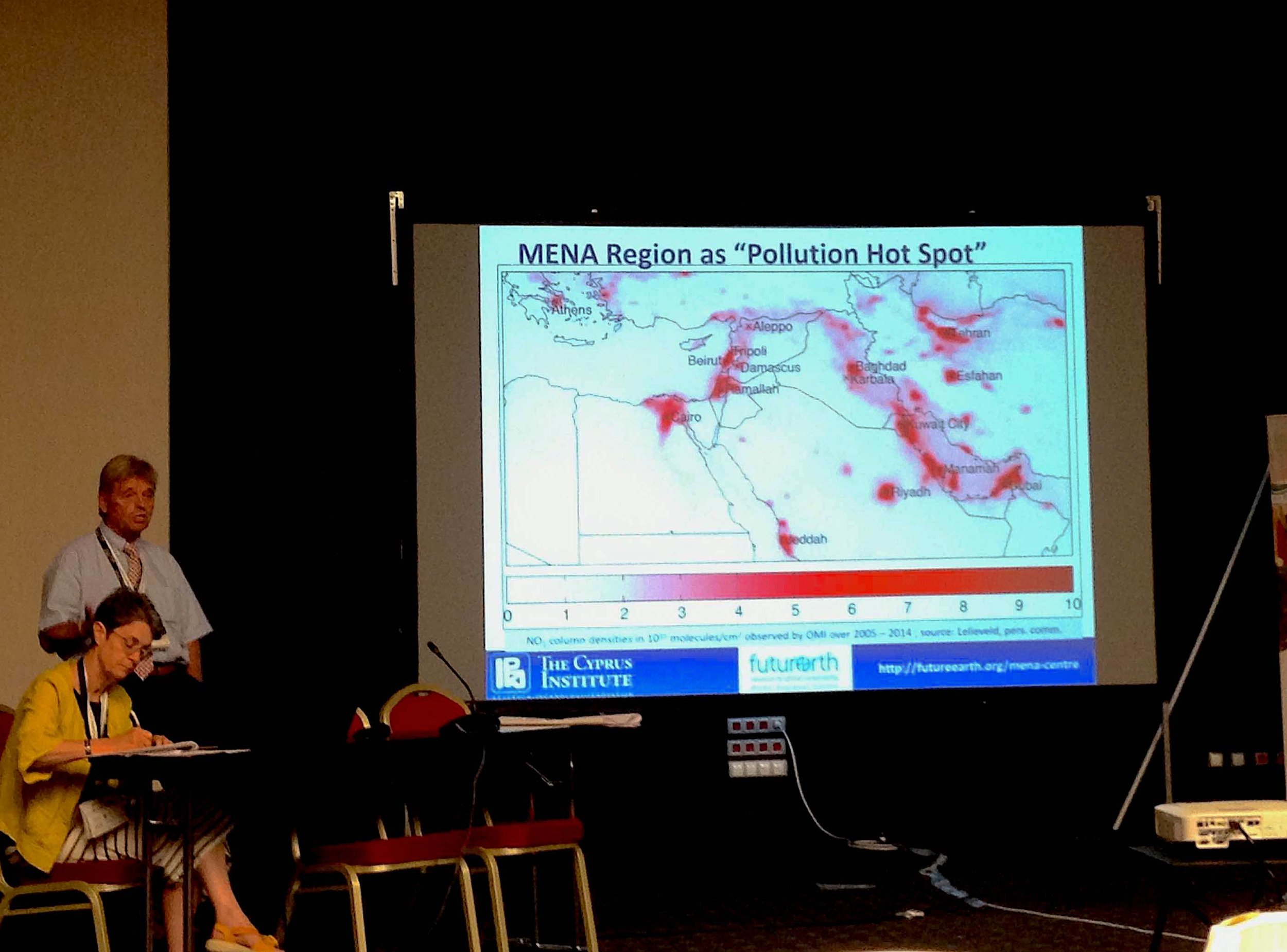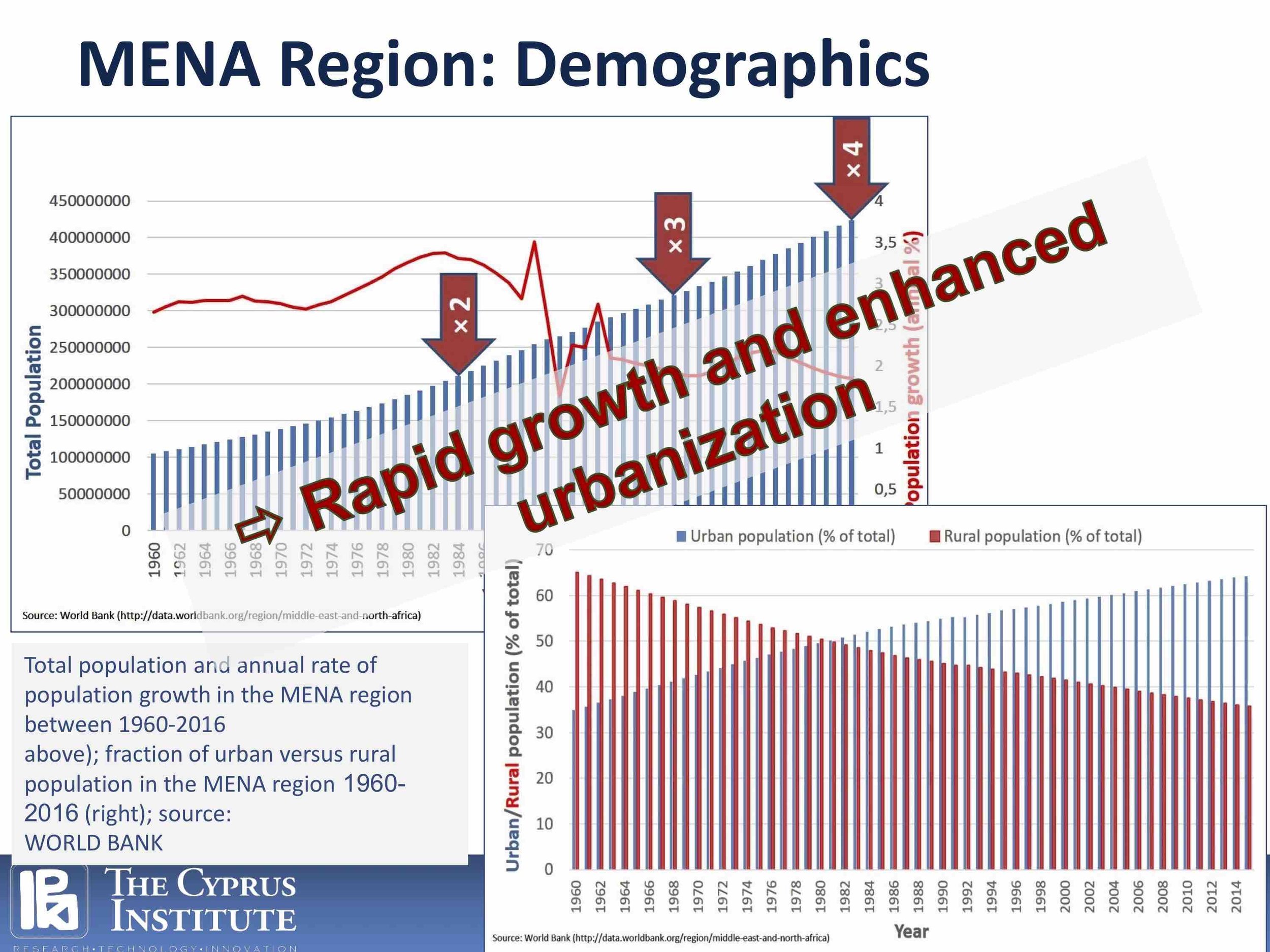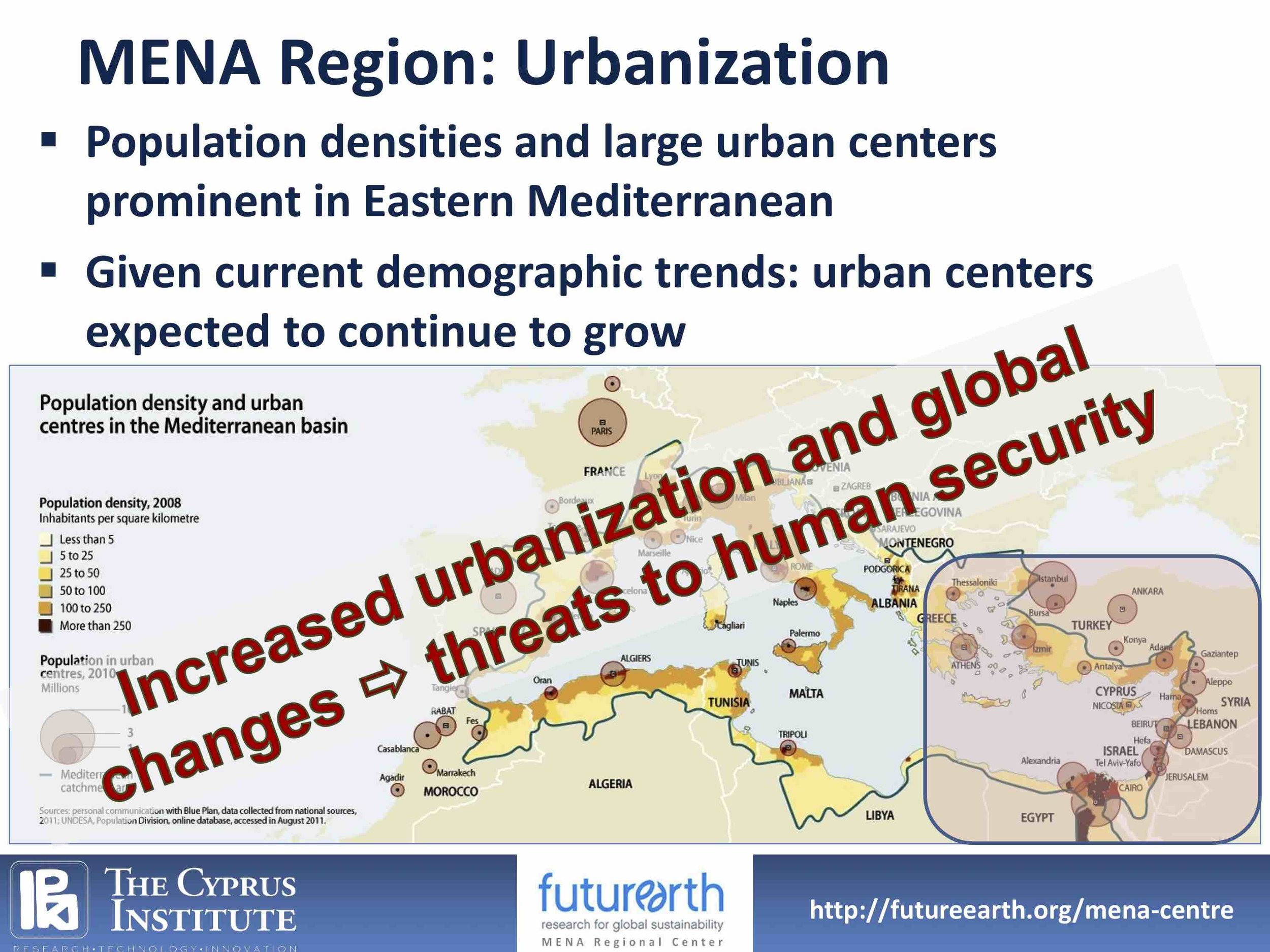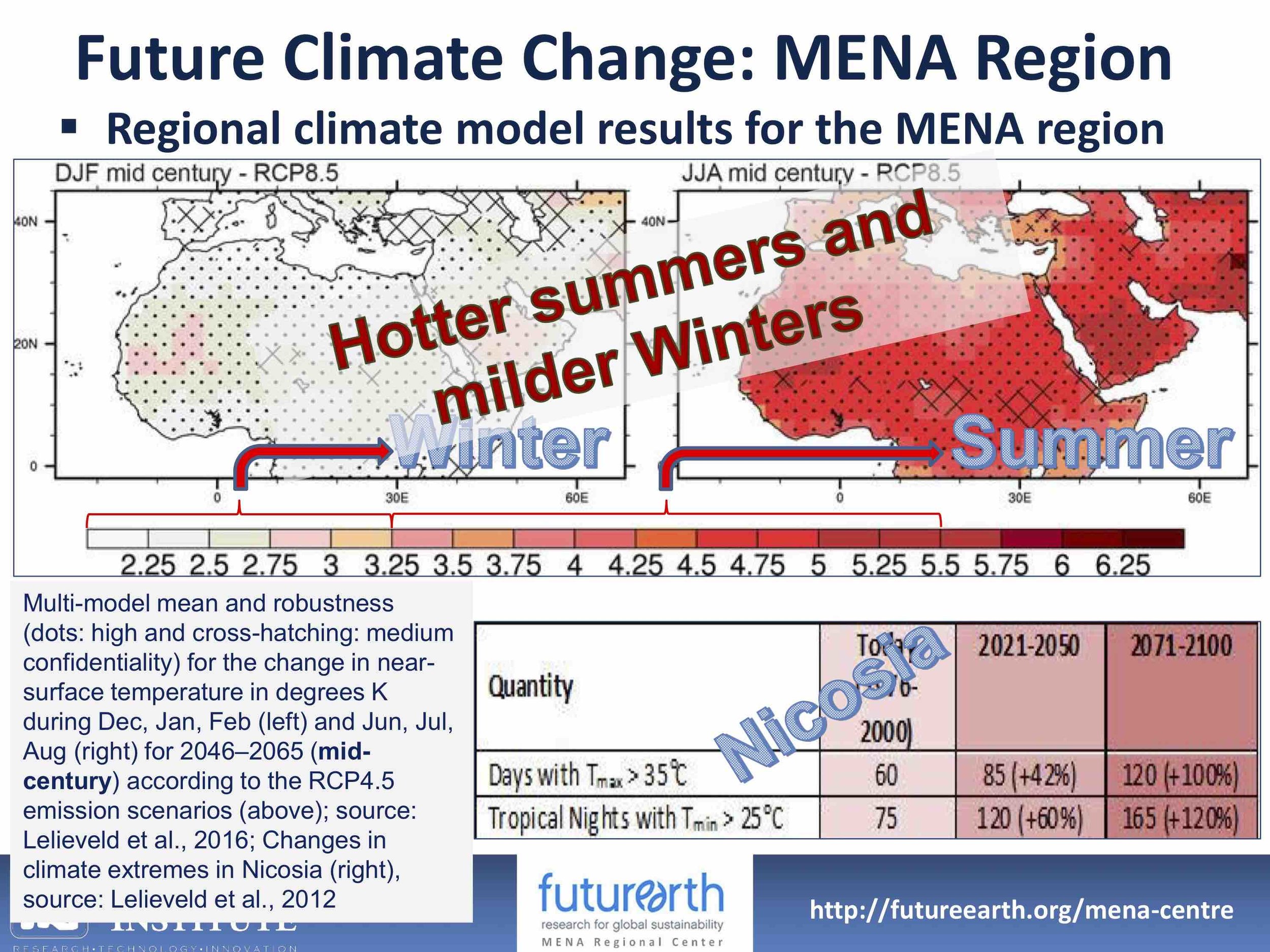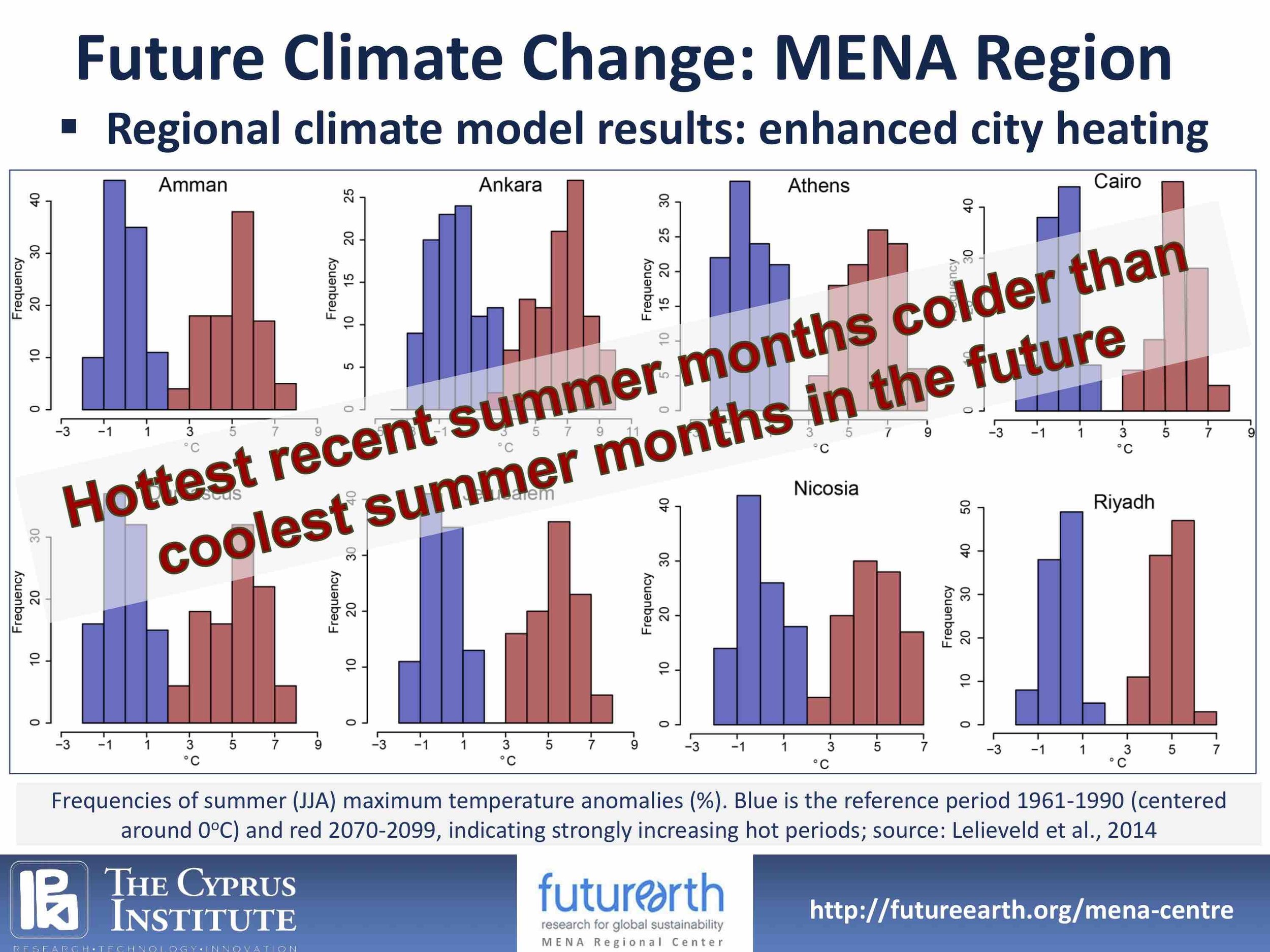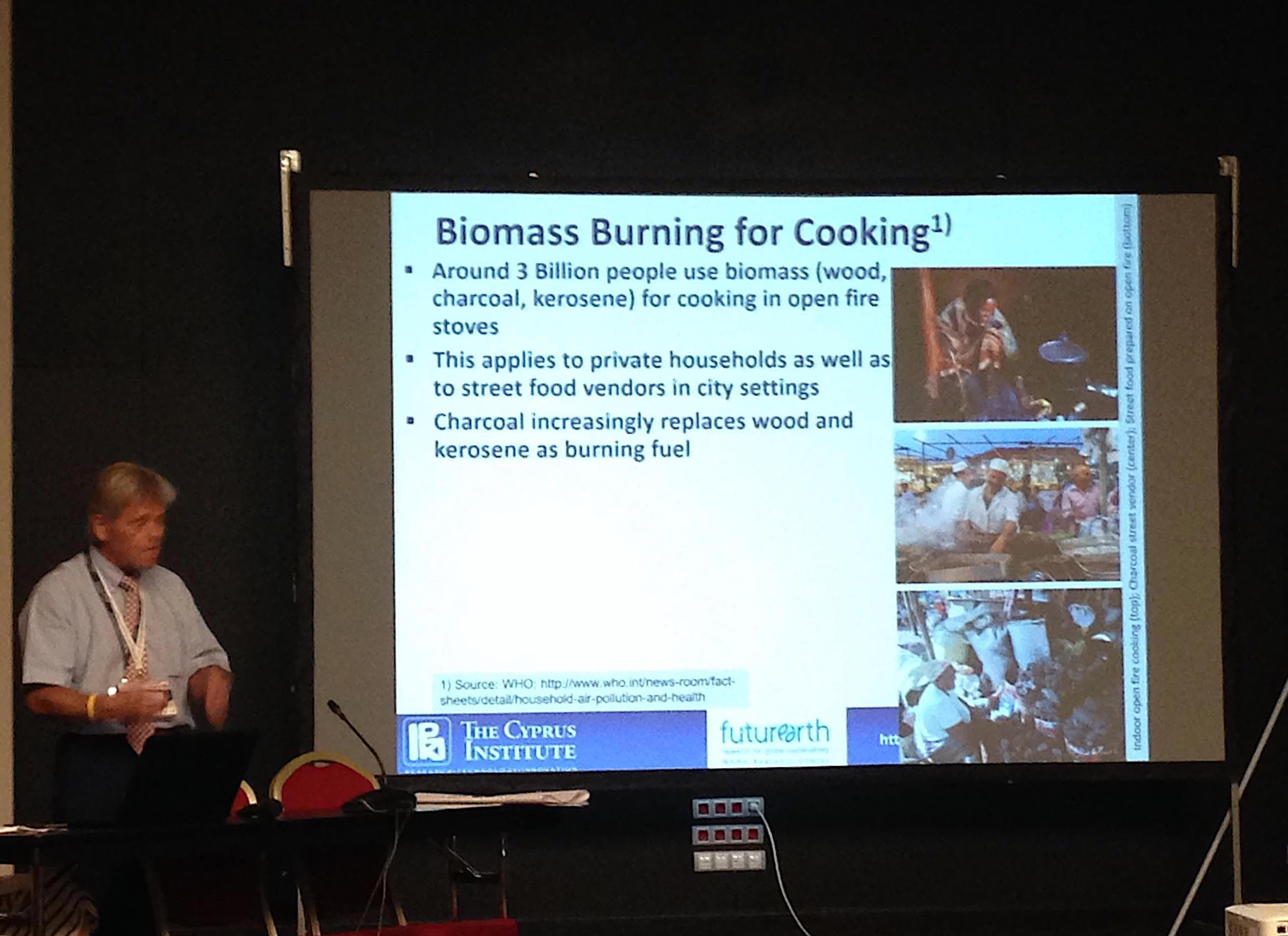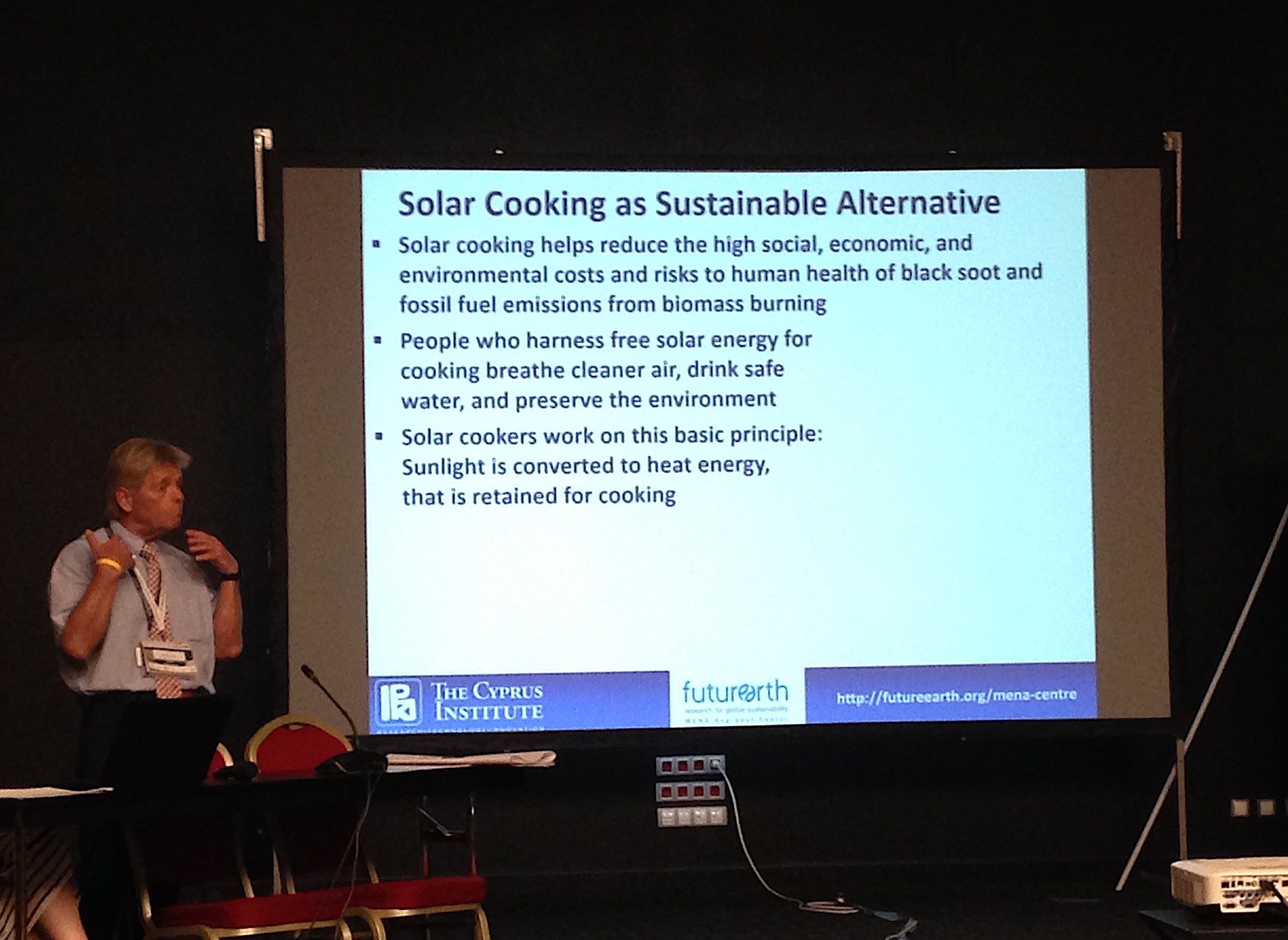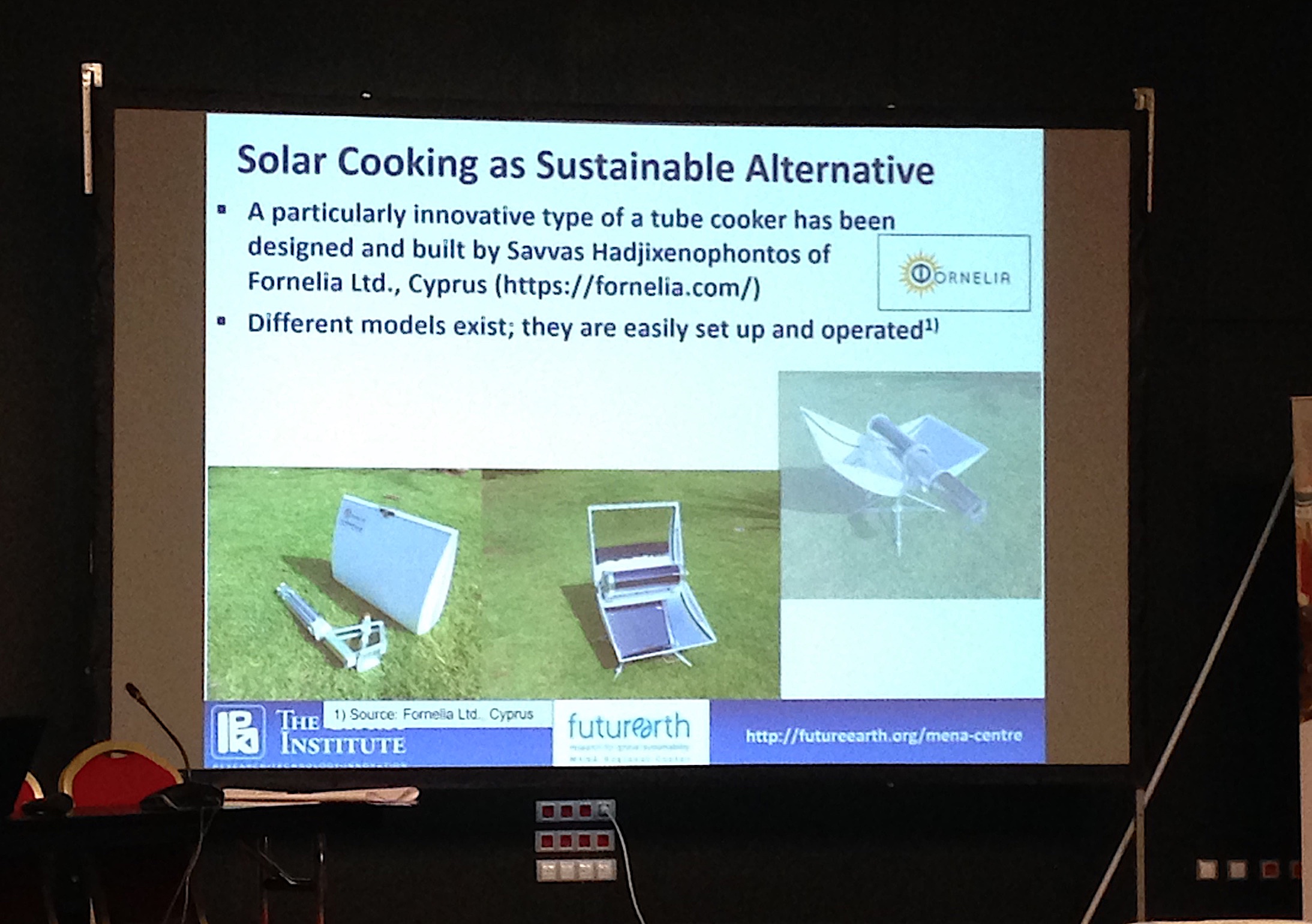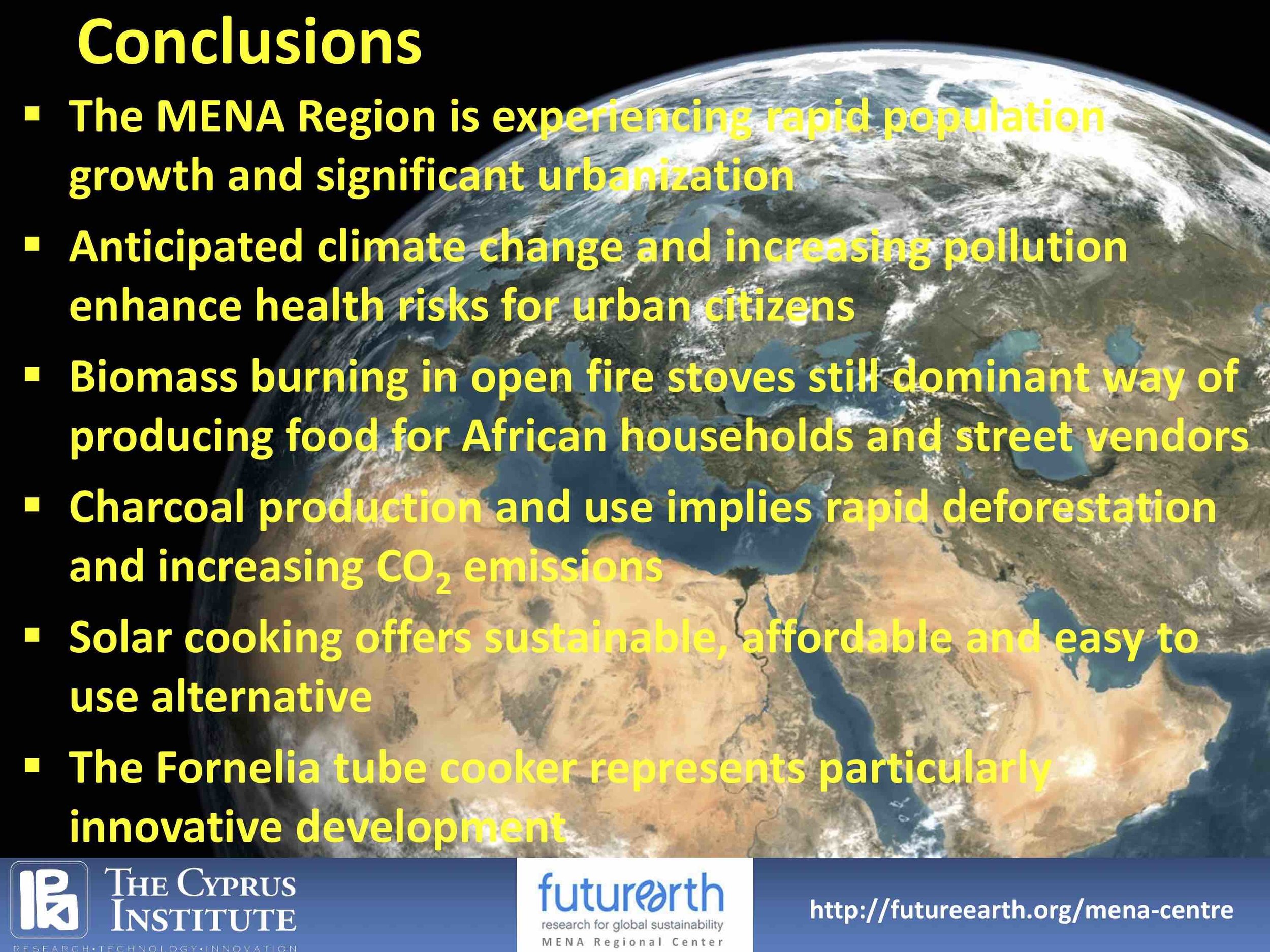CBD—COP14
U.N. CONVENTION on Biological Diversity
Sharm El-Sheikh, EGYPT | 2018
The UN Biodiversity Conference CBD-COP14 was held in Sharm El-Sheikh, Egypt from 13-29 November 2018, under the theme “Investing in biodiversity for people and planet”. The event was attended by approximately 3,800 participants representing parties, other non-signatory governments, international and non-governmental organizations, indigenous peoples and local communities, academia, and representatives from the private sector.
The Conference also featured parallel summits in which all those working on different aspects of biodiversity conservation joined together to discuss achieving the objectives of the Convention on Biological Diversity and its corresponding protocols.
SOLAR Cooking in the MENA Region
The participation of the Future Earth MENA Regional Center (FEMRC) at the COP14 focused on a green energy topic, and was presented within the ‘Communication, Education & Public Awareness Fair’ (CEPA) and at the 6th Global Biodiversity Summit of Local & Subnational Governments, an official parallel COP event. The presentation, entitled “Solar Cooking in the MENA Region” was based around a specific solar cooker technology presented by ACTIVATE in our ongoing EM/MENA Project, as a clean energy solution for both urban use and for rural communities.
BACKGROUND TO THE PRESENTATION:
ACTIVATE’s EM/MENA Project originated from the idea of connecting individuals and research institutions around the Eastern Mediterranean, Middle East and North African region. In other words, to connect the “on the ground” perspective being carried out by individuals through innovative and hands-on practices, with the work being carried out in science centers and academia that are in greater direct contact with the policy-making sector.
The renewable energy focus of the FE MENA Regional Center at the U.N. Biodiversity Conference had its roots in ACTIVATE’s multi-project participation at the 2017 Seoul Biennale, S. Korea. During their time at this event, ACTIVATE’s guests and project collaborators FEMRC Director Dr. Manfred A. Lange and Cypriot inventor of the Fornelia Solar Oven met and had the opportunity to exchange ideas regarding solutions to the growing environmental challenges faced by the MENA region. Read more →
This exchange would eventually lead to the FE presentation of the solar oven within a policy-focused event such as the U.N. Biodiversity Conference. It also represents a practical example of how a past connection helped bridge the common goal of finding innovative, nature-based and regionally applicable solutions for the MENA region.
SUMMARY OF THE PRESENTATION:
The Mediterranean, Middle East and North Africa face potentially alarming consequences from climate change, and this area has been recognized as a “hotspot” in terms of climate impacts. The need for mitigation and especially adaptation measures is urgent, and one of the sectors addressed in this project is of that of renewable energy possibilities for the region.
Because of its vast solar potential, the region can benefit greatly from the significant opportunities arising from the necessary transition to a low-carbon economy. The challenges, but also the opportunities, of decarbonisation of the Energy Sector in the Mediterranean and MENA region are immense.
Conventional cooking in large parts of the MENA region is being done by burning of petroleum, wood and/or charcoal. Aside from numerous other implications, the extensive use of wood adversely affects forest ecosystems and thereby significantly reduces the bio-diversity of species depending on these ecosystems.
Solar cooking provides a viable, sustainable and economical alternative to the conventional form of food preparations. This issue comprised the central topic of our participation both at the CEPA Fair and Cities Summit.
The FE Regional delegation in Sharm el-Sheikh was made up of:
Director of FEMRC Dr. Manfred A. Lange (Head); Dr. Salah A. Soliman, Director of FE North Africa Office (FENARO); Melina Nicolaides, Dir. of ACTIVATE, member of the FEMRC Advisory Board.
INTRODUCTION TO THE 2018 COP EVENT
Egypt was the host to the 14th meeting of the signatories to the Convention on Biological Diversity in Sharm el-Sheikh, in the governorate of the South Sinai. The United Nations Biodiversity Conference which had the theme “Investing in biodiversity for people and planet”, marked the 25th anniversary of the Convention coming into existence and brought together decision-makers from more than 190 countries. The COP14 featured parallel summits in which representatives of civil society, local authorities, the private sector, youth groups, development agencies and so forth joined together to discuss achieving the objectives of the Convention on Biological Diversity and its corresponding protocols.
Egypt was the first country in the Arab region to host the CBD-COP, and was under the presidency of the Minister of Environment, Dr. Yasmine Fouad who stated that Egypt was one of the oldest countries in the world to preserve natural resources and biodiversity and that “the ancient Egyptians placed great importance on animals, birds and plants in their temples and monuments.” Moreover, that her country has the same commitment to preserving nature and its ecosystems as it has shown in preserving artifacts from its past Pharaonic, Greco-Roman, Coptic and Islamic civilizations.
According to Egypt’s Fifth National Report to the Convention of Biological Diversity, the country is home to 111 mammal species, 40 of them threatened with extinction. There are also 400 kinds of birds, of which 26 are threatened with extinction. It has 109 kinds of reptiles, 27 of them endangered. On its Red Sea coasts, the country has over 300 species of coral in addition to 1,000 fish species.
Minister Fouad announced that hosting the enormous event will show Egypt’s desire to preserve biodiversity, as well as to educate its citizens on the subject.
Above are images from around the United Nations Biodiversity Conference at the International Congress Center (SHICC), including pavilion exhibitions, actions and protests from civil society, COP youth volunteers, fairs, plenary sessions with Minister of Environment, Dr. Yasmine Fouad; CBD Executive Secretary, Ms. Cristiana Paşca Palmer; Khaled Fouda, Governor of the South Sinai.
BRIEF HISTORY of the CONVENTION ON BIODIVERSITY
The Convention on Biological Diversity (CBD), known informally as the Biodiversity Convention is a multilateral treaty that is legally binding. Countries that have joined it (the ‘Parties’) are obliged to implement its provisions. There are currently 196 signatories/parties to the CBD.
This CBD was first signed at the UN Conference on Environment and Development (the Rio Earth Summit) in Rio de Janeiro, Brazil, in 1992. It entered into force on 29 December 1993. This Convention was the first global agreement to cover all aspects of biological diversity: the conservation of biological diversity (or biodiversity); the sustainable use of its components; and the fair and equitable sharing of benefits arising from the use of genetic resources. Its objective is to develop national strategies for the conservation and sustainable use of biological diversity, and is often seen as the key international document regarding sustainable development.
In September of 2003, the Conference of the Parties (COP) to the CBD adopted a supplementary agreement to the Convention known as the Cartagena Protocol on Biosafety as a treaty for the governing of the movements of living modified organisms (LMOs) resulting from modern biotechnology from one country to another. At the 10th Conference of Parties to the CBD in 2010 in Nagoya, Japan, the Nagoya Protocol on Access to Genetic Resources and the Fair and Equitable Sharing of Benefits Arising from their Utilization (ABS) was adopted as a supplementary agreement. It aims to provide a legal framework for the effective implementation of one of the three objectives of the CBD: the fair and equitable sharing of benefits arising out of the utilization of genetic resources.
Preface to the FE Presentation on Solar Cooking
for the MENA Region
Following the UN’s World Urbanization Prospect Report of 2014, 54% of the world’s population now lives in metropolitan areas. By 2050, this percentage will increase to 86% in advanced countries, and 64% in developing nations. It is obvious that this trend poses significant challenges to the sustainability goals as proposed by various international organizations and initiatives such as the UN Sustainable Development Solutions Network.
Already now, the MENA region has a high degree of urbanization. The 30 largest cities in the Arab world with populations of more than one million account for 122 million inhabitants. The region saw a 400% growth in urban structures during 1970 to 2010. It is expected that over the next 40 years there will be an additional 200% growth of larger cites. Thus, the aforementioned sustainability challenges are of particular relevance to the MENA regions and its larger urban locations.
Climate change will have particularly strong manifestations in urban settings and Mega-cities. This is at least partly due to the “urban heat island effect”. It is expected that the lowest temperatures in June, July and August in the near future will be higher than the current hottest temperatures during the summer months. This will result in various impacts, including an enhanced scarcity of water resources due to high consumption and diminishing precipitation rates, adding to the aforementioned challenges due to demographic and other developments.
Dr. Manfred Lange, Director of FEMRC and head of the FEMRC’s delegation at the COP was an invited speaker at the Fair on experiences and best practices in Communication, Education and Public Awareness (CEPA-Fair), as well as an invited plenary speaker at the Sixth Global Biodiversity Summit of Local and Subnational Governments organized in the framework of the CBD-COP14 in the “Emerging Trends and Innovations” Focus Session.
The Future Earth presentations briefly introduced the major challenges faced by large MENA Cities, such as increasing growth of city population, increasing challenges of public and private transport, enhanced intensity and number of heat waves, growing scarcity of water and increased energy needs. The focus of the presentations was on the challenges to be faced by major cities in the larger MENA Region with regard to anticipated climate change and deteriorating air qualities and the associated risks to human health.
Open fire cooking has been identified as a major source of serious illnesses and of premature death of 30 Million people annually as reported by the World Health Organization. Moreover, the about 30 Million tons of charcoal that are annually used in Africa require about 150 Million tons of wood to be chopped down. This has serious consequences on forest ecosystems and their biodiversity. Burning of charcoal leads to significant emissions of greenhouse gases (particularly carbon dioxide) both in the process of producing it and of burning it.
The FEMRC presentations were entitled “Solar cooking as a Sustainable Alternative to Conventional Food Preparation in the MENA Region.”
At the CEPA Fair | Communication, Education & Public Awareness
The CEPA Fair is the CBD Secretariat’s event on Experiences and Best Practices in Communication, Education and Public Awareness and provides an opportunity for Parties and Organizations to highlight their work and contribution to the implementation of the three objectives of the Convention on Biological Diversity.
In this context, the FEMRC presentation aimed to inform the public and raise awareness about the use of solar energy as opposed to biomass cooking fuels in relevance to the realities of the region.
‘Solar cooking’ was the central focus, based on the fact that urban and rural cooking in large parts of Africa, in general, and Egypt and the Sinai Peninsula, in particular, is still based on either petroleum or wood/charcoal burning.
Click to enlarge
This has adverse effects on a number of issues including:
• sustainability of forest ecosystems
• indoor pollution
• local air quality
• human health, etc.
More specifically, Dr. Lange discussed the replacement of wood/charcoal-fired open fire stoves for cooking in private households and by street vendors with solar tube cookers and the multiple positive effects this sustainable alternative would have.
Go to CEPA FAIR page for the preview of the FE/ACTIVATE presentation:
https://www.cbd.int/cepa/cepafair/2018/presentations/cepa-fair-2018-futureearth-iclei.pdf
In more detail: Multiple applications for Solar Energy Cooking
The FEMRC presentations showcased an innovative technical device, the Fornelia portable solar oven which was presented at the “2017 Seoul Biennale of Architecture and Urbanism” in a project by FE collaborator, Melina Nicolaides, Dir. of ACTIVATE, regarding practical and nature-based solutions to the pressures of diminishing natural resources and of growing environmental challenges of the MENA region. The oven, which was used to cook simple meals on the spot, is designed and built by Savvas Hadjixenophontos, electronics engineer and inventor from Cyprus. His invention is an affordable renewable energy solution that can cook anything including meat, vegetables, even bread, through a process that is a healthier cooking method that traditional ovens, wood burning etc. Read more about the oven →
For the COP, the solar cooker was presented as a practical solution and way to replace biomass cooking fuels in urban and rural settings of Egypt and the Sinai Peninsula. The objective was to offer an interesting illustration at the CBD-COP14 of how using solar cookers instead of wood or petroleum fired ovens provides a most effective, highly environmentally desirable, and economical way of producing “fast and healthy food” in cities of the MENA area, a region of the world where it can be used year-round. The idea behind the FEMRC presentations was to share this knowledge and illustrate the many benefits of such an alternative way of cooking which include: avoidance of fossil fuel consumption, enhanced air quality by avoiding exhaust from fuel burning, a more sustainable use of natural resources and reduced risks to human health, to name but a few. Moreover, how they can be used in both urban and rural settings—from use in the household, in restaurants, even vendors in the street. The device was also particularly relevant in the host country, for daily cooking to desert-dwelling peoples, such as the Bedouin population of the South Sinai, Egypt.
Conventional cooking in large parts of the MENA region is being done by burning of petroleum, wood and/or charcoal. Using solar cookers instead of conventional ovens provides a most effective and highly environmentally desirable way of preparing food in urban or rural settings. The many benefits of such an alternative include: evasion of fossil fuel consumption, enhanced air quality by avoiding exhaust from fuel burning - as more people die each year because of poor indoor air quality from cooking on wood fuel or not having any clean sources of energy, than from war and violence combined. Other benefits include the minimization of resource use and the prevention of damage to forest ecosystems and their biological diversity.
Please note our objective was not to promote a product, but to offer an alternative and solution that could change a daily habit, and have far reaching effects on many levels regionally and beyond.
At the 6th Global Biodiversity Summit
The 6th Global Biodiversity Summit of Local and Subnational Governments gathered governors, mayors and other subnational government leaders from around the world to engage directly with national leaders and their key stakeholders during the CBD-COP14. The Summit was organized by ICLEI’s Cities Biodiversity Center, with the cooperation of the Secretariat of the Convention on Biological Diversity (SCBD) and the Network of Regional Governments for Sustainable Development.
This summit offered an opportunity for local and subnational governments to outline their existing efforts and commitments to incorporate nature-based solutions, an important yet underutilized solution for sustainability. Nature-based solutions are critical to sustainable urban development, as there are inherent benefits to working with nature in ways that harness its natural services, from flood retention to pollution control to air quality improvements.
The Summit’s “Emerging Trends and Innovations” session aimed to highlight emerging trends and innovations relevant to mainstreaming nature and nature-based solutions at the local and subnational levels, including topics such as innovative financing and possibilities for green technologies, nature (biodiversity), urban food systems and more.
In this session, the FEMRC presentation looked at the issue of solar cooking in Northern and East Africa from a broader perspective, dealing in particular with sustainability and human health issues in rural and urban conditions. The solar oven is fitting and practical solution, as the objective of the high-efficiency solar oven is to harness solar energy for the daily cooking of food, and it can be used by over 80% of the world’s population, and year-round in the MENA region.
Moreover, the discussions at the Summit addressed the possibility of expanding and implementing the use of the solar oven cooking as a sustainable alternative to food preparation in both on the ground rural locations and also on urban centers.
ICLEI delegates for the 6th Global Biodiversity Summit of Local and Subnational Governments
Conclusions
Most cultures, at some point in their development, have recognized the importance of respect towards the earth and the conservation of natural resources. However, over the past decades, humanity has caused unprecedented biodiversity loss, species extinction, ecosystem degradation and ecological damage from over-production and consumption patterns that have unsustainably exploited natural resources. Today’s man-made environmental problems such as climate change, soil degradation, and water scarcity increasingly threaten biodiversity, food and water security, and moreover, the livelihoods of communities across the world. The survival of humanity and the well-being of the Earth depends upon a rich biodiversity and healthy ecosystems, and the goods and services they provide as biological resources. These are also essential to humanity’s economic and social development.
Global efforts such as the Convention on Biological Diversity and its corresponding protocols that work on a national and regional level are vital, and delegates at the CBD-Cop14 of 2018 aimed to establish as a central objective, among other decision-making, a process for developing the post-2020 global biodiversity framework. This entailed increasing cooperation with other biodiversity-related conventions and organizations, and the need to mainstream biodiversity concerns. This was hailed as essential for the implementation of the 2030 Agenda for Sustainable Development and the Sustainable Development Goals.
Beyond the decisions taken following many lengthy negotiations, it was decided that a more engaging message and communication strategy on biodiversity was needed in order to capture public imagination, raise awareness and boost conservation efforts across many levels. The conference was regarded overall as a very successful COP, and the emphasis on the need to “work together” throughout the proceedings underscored the global realities of the moment. In other words, that despite of rising nationalism and populism and in many parts of the world that threatens to isolate countries in their decision-making processes despite the increasing and inter-related environmental pressures of the planet, we must all be advocating for partnership and collectivity.
And finally, it should be noted that the many warnings and studies that came out in 2018 regarding the threat of climate change needs to paralleled with the equally dangerous decline of the natural world and our vital natural assets. Biodiversity is just as important for the future of earth as reversing climate change. An upcoming study from the Intergovernmental Science-Policy Platform On Biodiversity and Ecosystem Services (IPBES), to be published in May 2019 is expected to outline how the loss of more species and destruction of nature is threatening human well-being for current and countless future generations. Climate change, biodiversity loss and land degradation are all three part of the main challenge: protecting the health of our natural environment and its species, and nature’s ability to contribute food and fresh water to a growing human population.






